

Statement of Purpose for Graduate School
Criteria for success.
- qualified for their program, and
- a good fit for their program’s focus and goals.
- You show a select group of skills and experiences that concisely convey your scientific accomplishments and interests.
- Your experiences are concrete and quantitative .
- Your personal statement is no more than 2 pages (less if you can, or if it is required by the school).
Structure Diagram
The graduate school Personal Statement (≈ Statement of Purpose ≈ Statement of Intent) is a document that complements your resume and application form, describing your profile in a narrative way and convincing the admission committee that you would be a good match for a particular department or program. Take into account that matching goes both ways: they should be interested in you, and you should be interested in them. Your personal statement should make this match clear.
Analyze Your Audience
Your personal statement will be read by a graduate committee – a handful of faculty from the program. They’re trying to determine if you will be a successful graduate student in their department and a successful scientist after you graduate. They are interested in your qualifications as a researcher, your career goals, and how your personality matches their labs and department.
The graduate committee probably reads hundreds of applications every year. To make it easy for them to figure out that you are a good fit, keep in mind the following suggestions:
- Make direct, concrete statements about your accomplishments and qualifications.
- Create a narrative that serves as a personal brand and helps them remember you.
- Give them some unique examples that describe you and make you stand out, and which will make them remember you as “that candidate that was so passionate about…” or “who has a lot of experience in…”, although they might not remember your name.
- Align your academic goals and motivations with specific research projects or research directions of the target department.
Assessing your match to the target program
A key point on writing your Personal Statement is to demonstrate that you have done previous research about the program to which you’re applying, that you understand its characteristics and objectives, and that you are really interested in joining it and willing to do your best to be successful in it. To do this:
- Read the program’s website. Learn about its faculty members and the projects they are working on. Check what topics and high level goals the department is committed to. Identify the main research areas.
- Get in contact with faculty and students in your target program. Browse recent publications and presentations but remember lab websites can be outdated and a publication may lag a few years behind the active research in a lab so pay attention to the motivation, direction, and methods of the faculty member over specific results. If you have had a positive discussion with someone at the department, you can include in your essay how those interactions confirmed that you would be a good match for the program.
Reflect before you start
To convince a graduate committee that you are ready for and excited about graduate school, first you need to be able to articulate this to yourself. Earnestly reflect on the following types of questions. A lack of authenticity is easy to detect.
- Why do I want to go to graduate school?
- How am I sure?
- Why will I be successful in graduate school?
- What can I do with the help of this degree that I couldn’t do before?
- Where do I want to be in a few years?
- How am I going to get there?
Create a personal narrative
Graduate programs invest in the professional and scientific growth of their students. Get the committee excited about investing in you by opening your essay with a brief portrait of what drives you as a scientist. What research directions are you passionate about, and why? What do you picture yourself doing in 10 years?
- E.g. “Graduate study is the first step towards my goal: I want to improve my ability as a researcher and gain more technical depth and breadth to maximize my impact. In the long term, I hope graduate school will better position me to be a leader in shaping the conversation about what problems can be addressed by mechanical engineers.”
Close your essay with a 2-3 sentence discussion of your long-term career interests. No one will hold you to this; this just helps your committee visualize your potential trajectory.
- E.g. “Above all else, a MIT PhD would help me achieve my long term career goal of becoming a professor, the position in which I can best see myself accomplishing my mission to show others the hidden beauty in everyday life through science.”
Connect your personal narrative to whichever degree you are applying to (be it research-based or course-work-based, or a Master of Science, Master of Engineering, or PhD). Especially in mechanical engineering, each of these degrees will enable different career trajectories and provide different educational opportunities. Articulate clearly why the degree you are applying for helps you achieve your goals. In the same vein, consider mutual benefit: what will you contribute to the academic community over your time at your target school? Remember, it all comes back to “qualified match” , no matter what level of degree you are applying for.
Describe your experiences
Experiences are the “what” of your essay. They are the most efficient and easiest way to prove your capabilities to the admissions committee.
- What experiences led you to develop your skill set and passions ?
- Where have you demonstrated accomplishment, leadership, and collaboration?
- Show your depth with a range of experiences: research, teaching, relevant extracurriculars and leadership positions.
- State concrete achievements and outcomes like awards, discoveries, or publications, or projects completed.
Achievements need not be limited to research projects or publications. Think about all the experiences that demonstrate your ability to conduct research and succeed within the structure of your target program. (Where have you demonstrated creativity? Self sufficiency? Perseverance? What open ended problems have you tackled? What enabled you to succeed at them?)
Quantify your experiences to show concrete impact. How many people were on your team? How many protocols did you develop? How many people were in competition for an award? As a TA, how often did you meet with your students?
For each experience you include, focus on how the experience affected you. Describe your actions, and always direct the message to highlighting your performance and growth (not how important the company was or how well-known the professor you TAed for is). Remember, it is not an essay about science, it is a personal essay—about you and how you have positioned yourself to succeed in graduate school.
Explain the meaning of your experiences
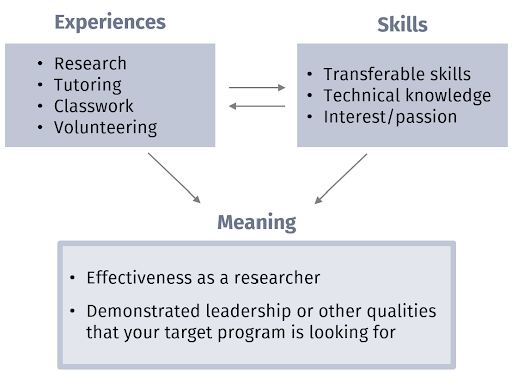
Your goal in sharing your experiences is to demonstrate that you have the qualifications, qualities, and drive needed to succeed in graduate school. Therefore, you will need to not only choose experiences wisely but also state specifically what they mean within the context of your application.
- Why was this experience important to your growth as a scientist?
- What did you gain from or demonstrate during that experience?
- How will this make you a better grad student?
Even if it feels obvious to you, you need to explicitly answer these questions to your audience. Here are some examples experiences that have been expanded to contain meaning:
Contemplate how disparate activities can be unified into a common narrative about your motivations and achievements. Articulate this clearly to make your statement cohesive.

Demonstrate your match to the target program
Using the research you did to assess your chosen programs, clearly articulate why you are a match . Consider both directions of the match: not only why you want to go to the school, but also why you would fit in well and contribute to the program.
State which professors in the program you would be interested in working with. Demonstrate that you have done your homework regarding the program. Show how their research areas align with your background and your goals. If you have had conversations with students or professors in the program, be sure to include that as well.
Common Pitfalls
Write about you , not your role models. One of the most common pitfalls we see in the Comm Lab is students writing touching Personal Statements about family members or role models who have inspired them. There is nothing wrong with including personal stories about people who have helped you understand yourself better, or positioned you to succeed in graduate school, but it is important to tread very carefully. Don’t leave the reader wondering why they are reading about someone else in a document that is meant to be about you. If you take time to talk about someone who positively affected you, make sure to be very clear about how that experience with that person molded you into a strong graduate school candidate.
Be judicious with childhood stories. A brief mention of some childhood experience that shaped your interests in STEM is probably okay, but if you talk about it at length (more than ~2 sentences), you are taking up space that should probably be used to talk about who you are today, not who you were over a decade ago.
Don’t simply restate your resume. Your Personal Statement should be a technical document (having evidence, numbers, and supporting facts) with personal outcomes (talking about your motivations, ambitions, and ability to succeed as a graduate student). Of course, you will reiterate parts of your resume in your Personal Statement , but what uniquely makes it a “Personal Statement” is the discussion of how those professional experiences affected you , as a researcher and person well-suited to the graduate program at X University.
Insufficient quantification of your experiences. We are all scientists and engineers; our line of work is inherently quantitative. Quantification is a quick and easy way to add context, lend credence to your experiences, and impress the reader. Even little quantifications can help: “I spent two semesters working on a project about…” is much better than “I spent some time working on a project about…”. See more examples in the section on Experiences, above.
Being a great student and having an impressive resume is only half the battle when it comes to graduate school applications. You need to be able to communicate and convince the committee that your personality and particular set of skills and experiences are well-suited to the graduate program you are applying for. This extends beyond graduate school applications: as scientists and engineers, we write papers and technical reports to communicate with our peers and convince them that our work is meaningful.
By reading this article, you have recognized the value of communication and are well on your way to crafting an effective and powerful Personal Statement. This is your opportunity to make yourself shine among all the other candidates, so make it count! You can do it!
Acknowledgements : This content was adapted from the NSE and CEE Communication Labs’ CommKits for graduate applications.
Resources and Annotated Examples
Annotated example 1, annotated example 2.
Which program are you applying to?

Accepted Admissions Blog
Everything you need to know to get Accepted

December 14, 2023
How to Write Your Master’s in Engineering Statement of Purpose

Top engineering graduate programs expect applicants to have a high GPA, and some schools also expect an impressive GRE score , though in recent years, more schools have made GRE scores optional. However, many of the applicants you will be competing against have high scores.
Your statement of purpose (SOP) is what will allow the adcom to view you as a person with unique goals, potential, interests, values, inspirations, and motivations. It helps adcoms understand what drives you, what your short- and long-term goals are, and how their school can help you realize your dreams. This is the part of the application that enables the adcom to assess whether you are a good match for their program.
Structuring an Engineering Statement of Purpose
Your SOP will ideally include the following:
- An introductory paragraph that grabs the reader’s attention and sets the stage for the paragraphs to follow
- A few highlights of your abilities, education, and work accomplishments
- Reasons for any gaps in your chronological work history or lower-than-average GRE score or GPA
- A description of your short- and long-term goals
- An explanation of your interest in this particular program and school, ideally including courses or professors (and their research) of interest to you and student organizations or research institutes in which you’d like to participate
- A summary paragraph that highlights key points and ties back to the introductory paragraph
Tell a Story in Your Statement of Purpose
While it’s important to include the elements listed in the previous section, a winning essay is also creative and interesting to the reader. It is not formulaic and shouldn’t read like a checklist.
In essence, you are telling a story – your story. An engineer recently said to me in a somewhat panicked voice, “I know how to write facts; I don’t know how to tell a story!” The typical MBA candidate loves to discuss their background and is frequently delighted to relate the many exciting adventures they’ve had. In contrast, if I say to an engineering candidate, “Tell me about yourself,” I am sometimes met with silence and a reluctance to divulge personal information.
Engineers are taught to think logically, rationally, in black-and-white facts and figures where there is a right and a wrong answer. A graduate school application expects you to explore the “gray” in your life. What made you decide on that option? What motivated you to take that action? Why is it important to you? There is no right or wrong, which can be freeing.
Why Engineering?
Engineering schools want to know what or who inspired you to become an engineer. At what age did you first believe that this was the right career path for you, and why? You need to step away and look at your life with a level of objectivity, so that you can explain your life trajectory and the reasons you took certain turns.
Most schools have a page or word limit for their SOP, but don’t let that inhibit you when you’re first creating your story from your outline. A good engineering admissions consultant can help you tell your story effectively and still meet the word limit requirements. Telling that story compellingly sometimes requires multiple drafts, and some of my past clients wrote as many as 12 drafts before they were satisfied with the final product.
As with the other elements of the application, give yourself sufficient time to write your SOP. It can be the reason the adcom at the engineering graduate program you’re targeting decides in favor of your admission.

With 30 years of career and admissions experience at four universities, including Cornell’s College of Engineering and Johnson Business School, Dr. Karin Ash facilitated students’ entry into the world’s best companies. As an adcom member, she also evaluated applications and therefore knows what schools and employers seek. Want Karin to help you get Accepted? Click here to get in touch!
Related Resources:
- Five Fatal Flaws to Avoid in Your Grad School Statement of Purpose , a free guide
- STEM Applicants: Why Your Statement of Purpose Is So Important
- Application Advice from Accepted Data Science Clients
About Us Press Room Contact Us Podcast Accepted Blog Privacy Policy Website Terms of Use Disclaimer Client Terms of Service
Accepted 1171 S. Robertson Blvd. #140 Los Angeles CA 90035 +1 (310) 815-9553 © 2022 Accepted


How to Write a Statement of Purpose for Graduate School

Congrats! You’ve chosen a graduate program , read up on tips for applying to grad school , and even wrote a focused grad school resumé . But if you’re like many students, you’ve left the most daunting part of the application process for last—writing a statement of purpose. The good news is, the task doesn’t have to feel so overwhelming, as long as you break the process down into simple, actionable steps. Below, learn how to write a strong, unique statement of purpose that will impress admissions committees and increase your chances of getting into your dream school.
What is a statement of purpose?
A statement of purpose (SOP), sometimes referred to as a personal statement, is a critical piece of a graduate school application that tells admissions committees who you are, what your academic and professional interests are, and how you’ll add value to the graduate program you’re applying to.
Jared Pierce, associate director of enrollment services at Northeastern University, says a strong statement of purpose can be the deciding factor in a graduate student’s admission.
“Your statement of purpose is where you tell your story about who you are and why you deserve to be a part of the [university’s] community. It gives the admissions committee the chance to get to know you and understand how you’ll add value to the classroom,” he says.
How long should a statement of purpose be?
“A statement of purpose should be between 500 and 1,000 words,” Pierce says, noting that it should typically not exceed a single page. He advises that students use a traditional font at a readable size (11- or 12-pt) and leave enough whitespace in the margins to make the statement easy-to-read. Make sure to double-space the statement if the university has requested it, he adds.
Interested in learning more about Northeastern’s graduate programs?
Get your questions answered by our enrollment team.
REQUEST INFORMATION
How to Write a Statement of Purpose: A Step-by-Step Guide
Now that you understand how to format a statement of purpose, you can begin drafting your own. Getting started can feel daunting, but Pierce suggests making the process more manageable by breaking down the writing process into four easy steps.
1. Brainstorm your ideas.
First, he says, try to reframe the task at hand and get excited for the opportunity to write your statement of purpose. He explains:
“Throughout the application process, you’re afforded few opportunities to address the committee directly. Here is your chance to truly speak directly to them. Each student arrives at this process with a unique story, including prior jobs, volunteer experience, or undergraduate studies. Think about what makes you you and start outlining.”
When writing your statement of purpose, he suggests asking yourself these key questions:
- Why do I want this degree?
- What are my expectations for this degree?
- What courses or program features excite me the most?
- Where do I want this degree to take me, professionally and personally?
- How will my unique professional and personal experiences add value to the program?
Jot these responses down to get your initial thoughts on paper. This will act as your starting point that you’ll use to create an outline and your first draft.
2. Develop an outline.
Next, you’ll want to take the ideas that you’ve identified during the brainstorming process and plug them into an outline that will guide your writing.
An effective outline for your statement of purpose might look something like this:
- An attention-grabbing hook
- A brief introduction of yourself and your background as it relates to your motivation behind applying to graduate school
- Your professional goals as they relate to the program you’re applying to
- Why you’re interested in the specific school and what you can bring to the table
- A brief summary of the information presented in the body that emphasizes your qualifications and compatibility with the school
An outline like the one above will give you a roadmap to follow so that your statement of purpose is well-organized and concise.
3. Write the first draft.
Your statement of purpose should communicate who you are and why you are interested in a particular program, but it also needs to be positioned in a way that differentiates you from other applicants.
Admissions professionals already have your transcripts, resumé, and test scores; the statement of purpose is your chance to tell your story in your own words.
When you begin drafting content, make sure to:
- Provide insight into what drives you , whether that’s professional advancement, personal growth, or both.
- Demonstrate your interest in the school by addressing the unique features of the program that interest you most. For Northeastern, he says, maybe it’s experiential learning; you’re excited to tackle real-world projects in your desired industry. Or perhaps it’s learning from faculty who are experts in your field of study.
- Be yourself. It helps to keep your audience in mind while writing, but don’t forget to let your personality shine through. It’s important to be authentic when writing your statement to show the admissions committee who you are and why your unique perspective will add value to the program.
4. Edit and refine your work.
Before you submit your statement of purpose:
- Make sure you’ve followed all directions thoroughly , including requirements about margins, spacing, and font size.
- Proofread carefully for grammar, spelling, and punctuation.
- Remember that a statement of purpose should be between 500 and 1,000 words. If you’ve written far more than this, read through your statement again and edit for clarity and conciseness. Less is often more; articulate your main points strongly and get rid of any “clutter.”
- Walk away and come back later with a fresh set of eyes. Sometimes your best ideas come when you’re not sitting and staring at your computer.
- Ask someone you trust to read your statement before you submit it.
Making a Lasting Impression
Your statement of purpose can leave a lasting impression if done well, Pierce says. It provides you with the opportunity to highlight your unique background and skills so that admissions professionals understand why you’re the ideal candidate for the program that you’re applying to. If nothing else, stay focused on what you uniquely bring to the classroom, the program, and the campus community. If you do that, you’ll excel.
To learn more tricks and tips for submitting an impressive graduate school application, explore our related Grad School Success articles .
Editor’s note: This article was originally published in March 2017. It has since been updated for thoroughness and accuracy.
Subscribe below to receive future content from the Graduate Programs Blog.
About shayna joubert, related articles.

Why Earn a Professional Doctoral Degree?

5 Tips to Get the Most out of Grad School

Is Earning a Graduate Certificate Worth It?
Did you know.
Advanced degree holders earn a salary an average 25% higher than bachelor's degree holders. (Economic Policy Institute, 2021)
Northeastern University Graduate Programs
Explore our 200+ industry-aligned graduate degree and certificate programs.
Most Popular:
Tips for taking online classes: 8 strategies for success, public health careers: what can you do with an mph, 7 international business careers that are in high demand, edd vs. phd in education: what’s the difference, 7 must-have skills for data analysts, in-demand biotechnology careers shaping our future, the benefits of online learning: 8 advantages of online degrees, the best of our graduate blog—right to your inbox.
Stay up to date on our latest posts and university events. Plus receive relevant career tips and grad school advice.
By providing us with your email, you agree to the terms of our Privacy Policy and Terms of Service.
Keep Reading:

The 8 Highest-Paying Master’s Degrees in 2024

Graduate School Application Tips & Advice

How To Get a Job in Emergency Management

Join Us at Northeastern’s Virtual Graduate Open House | March 5–7, 2024
- Skip to main content
- Prospective Students
- Current Students
- Apply Apply
- Follow Us

How to Write a Statement of Purpose for PhD Admission

The dreaded doctoral statement of purpose — every PhD program asks for it, but why is it so difficult to write? Writing a strong statement of purpose is essential to getting into your top PhD programs. A PhD statement of purpose gives admissions committees an introduction to your research interests and why their specific program is of interest to you.
Like a cover letter for a job application, a great statement of purpose allows you to highlight your strengths, interests and experience. If you need statement of purpose advice, keep reading for guidance on how to write a successful statement of purpose that will make your PhD application stand out.
Statement of purpose vs. personal statement
Though the two may sound similar, they’re not necessarily interchangeable. A personal statement gives insight into who you are, while a statement of purpose is meant to showcase what you want to do. Rarely will you be asked to write a personal statement for a PhD program.
As you go through the PhD application process, you will likely see schools requesting either a statement of purpose or a research statement. In most cases, they're both looking for the same thing. Admissions committees want to know about your academic background, your research goals and what you hope to accomplish as a candidate in a PhD program.
Your research goals should align with faculty research
Being admitted to a PhD program is a great feeling, but if you enroll in a program that doesn’t match your research interests or help support your career goals, you may be setting yourself up for disappointment later down the road.
Applying for admission to a program is all about fit. Faculty reviewers are looking for students who best represent the department’s mission and will help them obtain their research objectives.
By the time you apply, you should have a solid understanding of what the department’s primary research and content areas are, as well as which faculty members you’d like to work with more closely. This might mean finding information about what their labs do and reading published articles related to their work.
Be sure to include how your interests and past experiences align with the work that they do and how you would be an active contributor to those endeavors. This approach shows that you took the time to look into their program, so the committee will be more willing to invest theirs in reviewing your application.
Don’t be afraid to address your weaknesses
Many people assume they should avoid listing their shortcomings in their essays. The whole point of applying to a program is to impress the reviewers, right? But constructively addressing your weaknesses can be a great way to demonstrate how this program can help you achieve your academic goals.
Look at the catalog and read through the courses that are part of the program. If there is a particular class that fascinates you, talk about how it could help you obtain a new skill or a better understanding of a concept that you’ve struggled with before.
This demonstrates that you are actively seeking programs to help you better your education. It also exhibits that you’re mindful of what areas of your knowledge need some improvement, which shows maturity and the ability to self-assess.
Keep it succinct
If your program of interest does not specify a page word or word limit, it’s best to assume that your statement should not exceed two pages total. It should be enough to give them a glimpse of who you are and what you have to offer but not share your life story.
The aim is to communicate how and why this particular program will help you meet your academic and career goals. Limited space means you must prioritize what you include in your statement.
Create an outline before you start writing to ensure you are including points that are relevant to your application and the program to which you are applying. Your statement is also an example of how well you can write. By framing your essay before you write it, you can avoid stream-of-consciousness writing that can often come across as undefined and incoherent.
Proofread! And read it over and over
When you think you have a finished product, read your essay out loud. This makes it easier to catch typos, poor grammar, and oddly worded sentences. If you have a friend who is also applying to grad school, help each other out by editing each other’s essays.
Having someone else read your statement and ask questions can help you clarify your points and make it more compelling. Your statement is your one chance to present yourself professionally in your own words. The occasional mistake is excusable, but messy writing will make them think you lack attention to detail.
Before you hit submit on that application, be sure that you have attached the correct document for the right institution. It can be very embarrassing if your statement mentions the wrong faculty member’s name or refers to another school’s library! It could also cause the reviewers to think you are not as serious about their program.
You’ve spent a good amount of time perfecting your application, so take your time to review everything before you submit it so you can rest easy knowing you’ve presented your best.
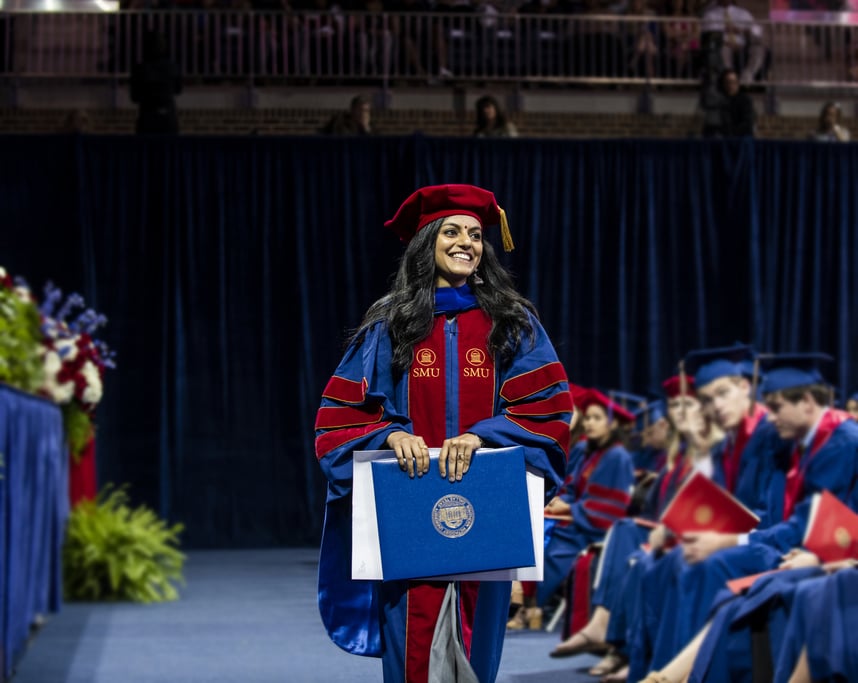
Get tips and learn more
about how to apply to a PhD by reading our guide on Choosing, Applying for, and Thriving in a PhD Program!

Request more
Information.
Complete the form to reach out to us for more information
Published On
More articles, recommended articles for you, 5 tips for writing your ph.d. dissertation.
Somewhere around the end of the first year of your Ph.D. program, you will probably start (or have...
How to Become an Assistant Professor: My Experience Finding a Job in Academia
One of the great benefits of earning a doctoral degree is the range of academic positions a PhD can...
Beyond the Tenure-Track But Still In the Heart of Academia
As a student who is entering or completing a Ph.D. program, you're probably thinking about the...
Browse articles by topic
Subscribe to.

Writing the Statement of Purpose
The statement of purpose should convince the admissions committee that your achievements show promise for your success in graduate study. Think of the statement of purpose as a composition with four different parts.
Make sure to check on the appropriate departmental website to find out if your statement should include additional or specific information.
Part 1: Introduce yourself, your interests and motivations
Tell them what you’re interested in, and perhaps, what sparked your desire for graduate study. This should be short and to the point; don’t spend a great deal of time on autobiography.
Part 2: Summarize your undergraduate and previous graduate career
a) Research you conducted. Indicate with whom, the title of the project, what your responsibilities were, and the outcome. Write technically, or in the style of your discipline. Faculty are the people who read these statements.
b) Important paper or thesis project you completed, as well as anything scholarly beyond your curricular requirements.
c) Work experience, especially if you had any kind of responsibility for testing, designing, researching or interning in an area similar to what you wish to study in graduate school.
Part 3: Discuss the relevance of your recent and current activities
If you graduated and worked prior to returning to graduate school, indicate what you’ve been doing: company or non-profit, your work/design team, responsibilities, what you learned. You can also indicate here how this helped you focus your graduate studies.
Part 4: Elaborate on your academic interests
Here you indicate what you would like to study in graduate school in enough detail to convince the faculty that you understand the scope of research in their discipline, and are engaged with current research themes.
a) Indicate the area of your interests. Ideally, pose a question, define a problem, or indicate a theme that you would like to address, and questions that arise from contemporary research. This should be an ample paragraph!
b) Look on the web for information about departments you’re interested in, including professors and their research. Are there professors whose research interests parallel yours? If so, indicate this. Check the specific program; many may require you to name a professor or professors with whom you might work.
c) End your statement in a positive manner, indicating your excitement and readiness for the challenges ahead of you.
Essential Tips
1. What the admissions committee will read between the lines: self-motivation, competence, potential as a graduate student.
2. Emphasize everything from a positive perspective and write in an active, not a passive voice.
3. Demonstrate everything by example; don’t say directly that you’re a persistent person, show it.
4. If there is something important that happened to you that affected your grades, such as poverty, illness, or excessive work, state it. Write it affirmatively, showing your perseverance despite obstacles. You can elaborate more in your personal statement.
5. Make sure everything is linked with continuity and focus.
6. Unless the specific program says otherwise, be concise; an ideal essay should say everything it needs to with brevity. Approximately 500 to 1000 well-selected words (1-2 single space pages in 12 point font) is better than more words with less clarity and poor organization.
Statement of Purpose
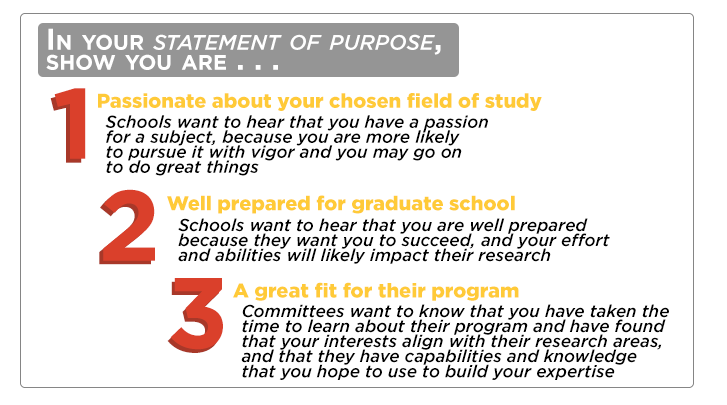
Selection committees want to hear that you have chosen to apply to their program for good reasons. Avoid telling them that it is because of rankings or that you grew up loving the university. It is very important for you to tailor your essay for each application that you submit.
Some schools ask for specific information or want specific questions to be answered. Be sure to focus your essay on the information requests. A well-written essay that doesn’t address the selection committee’s interests will be ineffective. Generally, most selection committees are interested in the following:
- Why do you want to pursue this discipline?
- What are your specific goals for graduate study?
- What are your goals beyond graduate study?
- How have you prepared academically?
- What experiences have helped you prepare?
- What attracted you to apply to this program?
The essay is also a sample of your communication skills. It should be written in essay form with an introduction, body and closing. It should be well organized, easy to read, and interesting. Organization is flexible but is should flow as you tell your story. It should be error free and within the word limit, if one is imposed (500 words is common). Have several people review it for errors and have it critiqued by a professor or career services professional.
Introduction
- Start with something that will get the reader’s attention and make them want to read more (a passionate hook).
- It often works well to use this paragraph to tell the selection committee why you are passionately interested in your chosen field of study, since this is usually the most interesting part of your personal story.
Example: It is remarkable that so much can be learned from microscopic analysis of material surfaces and how this information can be used to improve designs. Exposure to failure analysis, dislocations, and point defects as an undergraduate fascinated me and produced a strong curiosity in me about the structure of materials. This has led me to pursue a PhD in Materials Science and Engineering, and I would like to conduct my graduate work at Iowa State University.
Body (Several Paragraphs)
- Segway into your arguments for why you should be admitted to the specific program. The focus should be on your academic preparation for graduate school and why you have chosen their program. It shouldn’t matter which topic you begin with.
- Important classes that provided you with knowledge that you hope to build on. (If a well-known and respected professor taught a class, sometimes it helps to mention his or her name.)
- A project that you completed that provided you with knowledge that other applicants probably don’t have.
- Contributions you have made to research projects during an REU or work experience. Indicate the principal investigator(s), the title of the project, what your responsibilities were and the outcome.
- Publications or presentations that you co-authored or received acknowledgement for your work.
- Internships and other work experiences that have provided opportunities to develop skills that will be useful for conducting research and completing projects.
- One or two extracurricular activities that relate to your preparation for graduate school or convey a virtuous personal quality.
- Significant problem with your qualifications that will be noticed by the selection committee (e.g. a low GPA or entrance level score). Explain it and why you are a better student because of it.
- An area of emphasis or research that aligns with your interests and goals.
- Particular strengths of the program that you noted during your research.
- Professors whose interest areas match yours that you hope to learn from. Don’t just mention names, but rather, indicate what aspects of their research interest you.
- Special facilities that you have read about or seen during a visit.
- Begin your closing paragraph by restating your desire to be admitted into the specific program.
- End in a positive and confident manner that indicates a readiness for the challenges of graduate study.
- PREVIOUS STEP: Curriculum Vitae Section Tips
- NEXT STEP: Letters of Recommendation

Departments
- Applied Physics
- Biomedical Engineering
- Center for Urban Science and Progress
- Chemical and Biomolecular Engineering
- Civil and Urban Engineering
- Computer Science and Engineering
- Electrical and Computer Engineering
- Finance and Risk Engineering
- Mathematics
- Mechanical and Aerospace Engineering
- Technology, Culture and Society
- Technology Management and Innovation
Degrees & Programs
- Bachelor of Science
- Master of Science
- Doctor of Philosophy
- Digital Learning
- Certificate Programs
- NYU Tandon Bridge
- Undergraduate
- Records & Registration
- Digital Learning Services
- Teaching Innovation
- Explore NYU Tandon
- Year in Review
- Strategic Plan
- Diversity & Inclusion
News & Events
- Social Media
Looking for News or Events ?
Statement of Purpose
A statement of purpose describes your study interests, goals, and program fit

Related Links
Your statement of purpose should be a typewritten, double-spaced, well-organized statement explaining why you wish to pursue graduate study through your program of interest at NYU. This is your opportunity to introduce yourself and to inform the department about your goals, interests, and career plans as they relate to your intended academic pursuits. Please make sure to include your name as it appears on your application, the program you are applying to, and the date. This document can be uploaded directly to your online application portal.
For those applying as a Cyber Fellow: Applicants to the NYU Cybersecurity M.S. program who are also applying to be considered for the NYU Cyber Fellow scholarship must submit a well-organized statement of purpose that is a maximum of 250 words .
For all other applicants: Applicants to any other program or applicants to the Cybersecurity M.S. who are not interested in being considered for the Cyber Fellows scholarship must submit a well-organized statement of purpose that is a maximum of one- to two-pages .
How to write a strong Statement Of Purpose
Your statement of purpose should assure readers—primarily the faculty on the selection committee—that your background and experience will support your success in graduate study. Think of the statement of purpose as a composition with five key parts:
Share your interests — what sparked your desire for graduate study? This should be short and to the point; you don’t need to spend a great deal of time on your autobiography. You can elaborate on your areas of academic interest later in the statement.
Include details such as:
- Research you have conducted. Indicate with whom, the title of the project, what your responsibilities were, and the outcome. The graduate admissions committee is composed of faculty so write technically, or in the style of your discipline.
- Important papers or thesis projects you’ve completed, as well as related extracurricular activities.
- Awards or recognitions you’ve received for the scholarly achievements discussed.
- Related internship experience, especially if you’ve had any responsibility for testing, designing, researching or interning in an area similar to what you wish to study in graduate school.
If you have ongoing projects or work experience, indicate the scope of that work. Whether for a company, non-profit, design team, etc, include your responsibilities, what you learned, etc. You can also indicate how this will help you focus your graduate studies. Cyber Fellows applicants: You can skip this portion for brevity!
Use this part of your statement to indicate what you would like to study in graduate school in enough detail to show the graduate admissions committee that you understand the scope of research in a specified discipline. This can include engagement with current research themes, and/or reasons why this specific program would be a good fit for you. Indicate your area(s) of interest. Ideally, pose a question, define a problem, or indicate a theme that you would like to address and questions that arise from contemporary research that you would like to investigate. This is a key paragraph!
End your statement in a positive manner, indicating your excitement and readiness for the challenges ahead.
- Vanderbilt Home
- Faculty & Staff
- News & Events
- Get Social @Vanderbilt
- About Engineering
- Meet the Dean
- Board of Visitors
- General News
- Lecture Series
- Undergraduate
- Department of Biomedical Engineering
- Department of Chemical and Biomolecular Engineering
- Department of Civil and Environmental Engineering
- Department of Computer Science
- Department of Electrical and Computer Engineering
- Department of Mechanical Engineering
- Division of Engineering Science and Management
- Interdisciplinary Materials Science
- Research Overview
- Centers and Institutes
- Research News
- Undergraduate Summer Research
- Alumni Overview
- Academy of Distinguished Alumni
- Circle of Distinguished Friends
- Mentor Program
- Faculty Directory
- Staff Directory
- Active Faculty Hiring Searches/Openings
- Dean's Office
The Engineering VU

4 Tips for Writing a Statement of Purpose for Your Master’s
When applying for a master’s degree, crafting a compelling statement of purpose (SOP) is a crucial component of a stand-out application. It is a key step in the application process in which you have the opportunity to showcase your genuine desire to join the program. In this blog, we will guide you through essential strategies to help you compose the best statement of purpose for your master’s degree.
What Is a Statement of Purpose?
A statement of purpose (SOP) is a written document that outlines your academic and professional goals, research interests and motivations for pursuing a graduate degree. It serves as a crucial piece of your application, allowing admissions committees to assess your suitability for their program. The statement of purpose provides you with an opportunity to showcase your passion, qualifications and unique qualities that make you stand out as a candidate. It allows you to share your aspirations and explain how the specific graduate program aligns with your academic and career goals. A strong SOP will make a lasting impression on the admissions team, and in turn, bolster your chances of admission.
Tips for Writing a Statement of Purpose For Your Master’s
To help you present yourself effectively, follow these three steps to craft a quality statement of purpose for your master’s
1. Include All the Elements of an Effective Statement of Purpose
A well-structured statement of purpose exhibits your writing skills and clearly states your motivations and goals. Key sections include an introduction, academic and career goals, fit for the program, relevant experiences and achievements and what sets you apart. Check out these statement of purpose templates for inspiration to get you started. You will want to expound upon the following elements when writing your statement of purpose.
Academic and Career Goals
Articulate your short-term and long-term academic and career goals. Clearly communicate how the program aligns with these aspirations and how it will help you achieve them. Emphasize the specific features and strengths of the program that attracted you to it.
Fit for the Program
Demonstrate your genuine interest in the program by showcasing thorough research on the curriculum, faculty and resources. Highlight elements like specific courses, faculty expertise, research opportunities or extracurricular activities that resonate with your interests.
Relevant Experiences and Achievements
Highlight your academic and professional achievements that are relevant to your field of study. Discuss research projects, internships, publications or significant coursework that have shaped your skills and knowledge. Connect these experiences to your goals, showing how they have deepened your passion for the field.
What Makes You Unique
Distinguish yourself from other applicants by highlighting your unique skills, perspectives and experience you will bring to the program. Show how these factors will enrich the program and contribute to the academic community.
Leave a lasting impression in your conclusion by expressing enthusiasm for the program. Summarize key points and end with a strong statement that reinforces your commitment to contribute to your chosen field of study. Incorporating these elements into your statement of purpose will help you craft a strong SOP for your application.
2. Do Not Skip the Proofreading Step
No matter how strong your statement of purpose may be, errors and inconsistencies can undermine your efforts. To polish your statement of purpose, be sure your writing is clear, concise and persuasive. Be straightforward about why you want to pursue this program and why you are the optimal candidate. Try to avoid complex technical jargon that could obscure your message. After you have checked over your SOP for these elements, read your statement of purpose aloud to catch errors. You can also ask a friend or mentor to read your statement of purpose and provide feedback. Getting an objective assessment can reveal areas that need improvement.
If possible, seek feedback from someone in the field or someone who has gone through a similar application process and has successfully written a statement of purpose.
3. Tailor Your SOP to Your Program
When applying to different programs, it's important to tailor your statement of purpose to match the specific requirements and expectations of each program. Here are some tips for crafting SOPs for different programs:
Statement of Purpose for a Master's in Computer Science
For a master's degree in computer science, it is crucial to highlight your technical interests and experiences in the field. Describe specific projects or research demonstrating your skills and passion in areas relevant to computer science. Discuss your career goals and how the program will help you achieve them. Mention any specific courses, faculty or opportunities that align with your interests.
Showcase your problem-solving abilities and analytical mindset to demonstrate your potential contributions to the field.
Statement of Purpose for Engineering Management
If you are applying to an engineering management program, emphasize your leadership and career aspirations in this field. If you have management experience, highlight your experiences managing projects, teams or organizations to showcase your capabilities. If you lack management experience, share some of the missed opportunities or future opportunities for which the degree could prepare you. You will also want to include your interest in bridging the gap between engineering and business, and how you can apply both technical and managerial skills to solve complex problems.
Connect your career goals to the specific aspects of the program, such as relevant courses, innovation opportunities or industry connections.
Getting Started on Your Master's Statement of Purpose
To write a compelling SOP, keep these key takeaways in mind:
- Be authentic and genuine in your writing. Share your motivations, experiences and goals with sincerity.
- Emphasize the research you have done on the program, faculty, courses, and resources. Show that you have a clear understanding of what the program offers and how it aligns with your academic and career objectives.
- Invest time and effort into your SOP to put your best foot forward. This document plays a significant role in the admissions process and can greatly influence your chances of admission.
Remember, each program has unique expectations, so tailor your statement of purpose accordingly. By aligning your strengths and interests with the requirements of the program, you can create a compelling SOP that captures the attention of the admissions committee.
Discover the Vanderbilt School of Engineering’s online master’s degrees in computer science and engineering management . You can explore our program pages to learn more about application requirements and how these degrees can advance your career in computer science or career in engineering management .
Take the next step into making your future career a reality. Apply now to start your journey towards your master's degree!

Topics: Engineering Management , Computer Science , Engineering Online

Vanderbilt Engineering Graduate Admissions Team
The Engineering Graduate Admissions Team is committed to providing you with the resources you need as you determine the next step for your future.
Other Blogs

You Should Continue Your Engineering Education Online — Here's Why

Charting Your Engineering Management Career Path

Master's in Engineering Management vs. MBA: What's the Difference
Subscribe to, request more information.
Have questions about Vanderbilt University's admissions process or our respected engineering programs? Fill out the form below to hear from Vanderbilt University's graduate admissions team.
Connect with Vanderbilt
Creating solutions.
Cyber-physical Systems
Biomedical Imaging & Biophotonics
Rehabilitation Engineering
Nanoscience and Nanotechnology
Risk, Reliability and Resilience
Big Data Science and Engineering
Regenerative Medicine
Surgery and Engineering
Energy and Natural Resources
Meet our Faculty
Explore Degree Programs
Explore Solutions
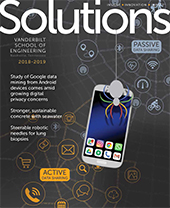
Testimonials
Free Resources
PrepScholar GRE Prep
Gre prep online guides and tips, 7 successful statement of purpose examples.
Not sure what graduate schools are looking for in a statement of purpose? Looking at successful graduate school statement of purpose samples can help! In this guide, we’ll orient you to what makes a great statement of purpose or letter of intent for graduate school. Then we’ll provide you with four successful statement of purpose examples from our graduate school experts. We’ll also provide analysis of what makes them successful. Finally, we’ll direct you to even more helpful examples that you can find online!
The Graduate School Statement of Purpose: An Overview
A statement of purpose (also called a letter of intent or a research statement) introduces your interests and experience to the admissions committee. For research-focused programs, like most PhDs and many master’s degrees, your statement of purpose will focus primarily on your past research experience and plans. For more professionally-focused graduate programs, your statement of purpose will primarily discuss how your pursuit of this professional program relates to your past experiences, and how you will use the skills from the program in your future career.
A statement of purpose for grad school is also where you sell the admissions committee on why you belong in their program specifically. Why do you fit there, and how does what they offer fit your interests?

What’s in a Great Grad School Statement of Purpose?
Here are the essential elements of a strong graduate school statement of purpose:
Clear Articulation of Goals and Interests
A strong statement of purpose will clearly and specifically lay out your goals in undertaking the program and what you hope to accomplish with the degree. Again, for a research-focused program, this will focus primarily on the research project(s) you want to undertake while you are there. For a more professional program, discuss what interests you within the professional field and what skills/knowledge you hope to gain through the program.
Quick side note: we've created the world's leading online GRE prep program that adapts to you and your strengths and weaknesses. Not sure what to study? Confused by how to improve your score? We give you minute by minute guide.
You don't NEED a prep program to get a great GRE score. But we believe PrepScholar is the best GRE prep program available right now , especially if you find it hard to organize your study schedule and don't know what to study .
Click here to learn how you can improve your GRE score by 7 points, guaranteed .
You should be as specific as possible in discussing what interests you. Use examples of particular phenomena, tools, or situations that you find exciting. If you are vague or say that everything in the field interests you, you run the risk of seeming unfocused or not actually that passionate.
Don’t worry that being too specific will box you into a particular research area or subfield during your entire tenure in graduate school. Your program understands that interests change—they won’t be pulling out your research statement to cross-reference with your dissertation proposal!
Evidence of Past Experience and Success
A great graduate school statement of purpose will also show programs that you have already been successful. They want applicants that will be able to follow through on their research/professional plans!
To this end, you’ll need to provide evidence of how your background qualifies you to pursue this program and your specific interests in the field. You’ll probably discuss your undergraduate studies and any professional experience you have. But be sure to draw on specific, vivid examples. You might draw on your thesis, major projects you’ve worked on, papers you have written/published, presentations you’ve given, mentors you’ve worked with, and so on. This gives admissions committees concrete evidence that you are qualified to undertake graduate study!

Interest and Fit With the Program
The third essential ingredient to a great statement of purpose is to clearly lay out why you and the program are a good fit. You should be able to identify both specific reasons why your work fits with the program and why the program suits your work/interests! Are there particular professors you’d like to work with? Does the department have a strong tradition in a certain methodology or theory you’re interested in? Is there a particular facet to the curriculum that you’d like to experience?
Showing that you and the program are a match shows that you chose the program thoughtfully and have genuine interest in it. Programs want to admit students who aren’t just passionate about the field. They want students who are genuinely enthused about their specific program and positioned to get the most out of what they have to offer.
Strong Writing
The final essential piece of a strong statement of purpose or letter of intent is strong writing. Writing skills are important for all graduate programs. You’ll need to demonstrate that you can clearly and effectively communicate your ideas in a way that flows logically. Additionally, you should show that you know how to write in a way that is descriptive but concise. A statement of purpose shouldn’t ever be longer than two pages, even without a hard word limit.
Admissions committees for humanities programs may be a little more focused on writing style than admissions officers for STEM programs. But even in quantitative and science-focused fields, written communication skills are an essential part of graduate school. So a strong statement of purpose will always be effectively written. You’ll see this in our statement of purpose for graduate school samples.

Real, Successful Statement of Purpose Samples
In this section, we’ll present four successful graduate school statement of purpose examples from our graduate school experts, along with a brief commentary on each statement. These statements come from a diverse selection of program types to show you how the core essentials of a statement of purpose can be implemented differently for different fields.
Note: identifying information for these statements have been changed—except for example four, which is my statement.
- Statement of Purpose Sample One: Japanese Studies MA

This statement of purpose is notable for its great use of space and its vivid descriptions. The author is able to cram a lot into about a page. She discusses how she came to her two primary research interests (and how they are connected). She integrates this discussion of her interests with information on her past experiences and qualifications for pursuing the course of study. Finally, she includes details on her goals in pursuing the program and components of the program that interest her. Her examples are specific and fleshed-out. There’s a lot very cleverly included in a small amount of page space!
Additionally, the language is very vivid. Phrases like “evocative and visceral” and “steadily unraveling,” are eye-catching and intriguing. They demonstrate that she has the writing skills necessary to pursue both graduate study and her interest in translation.
- Statement of Purpose Sample Two: Music MM
This sample is fairly long, although at 12 point Times New Roman it’s under two pages single-spaced. The length of this statement is partially due to the somewhat expansive nature of the prompt, which asks what role music has played in the applicant’s life “to date.” This invites applicants to speak more about experiences further in the past (in the childhood and teen years) than is typical for a statement of purpose. Given that this is for a master’s degree in music, this is logical; musical study is typically something that is undertaken at a fairly young age.
This statement does an excellent job describing the student’s past experiences with music in great detail. The descriptions of the student’s past compositions and experiences performing new music are particularly vivid and intriguing.
This statement also lays out and elaborates on specific goals the student hopes to pursue through the program, as well as features particular to the program that interest the student (like particular professors).

- Statement of Purpose Sample Three: Economics PhD

One of the first things you’ll likely notice about this statement is that it’s a little on the longer side. However, at 12 point Times New Roman font and single-spaced, it still comes in under 2 pages (excluding references). It makes sense for a PhD statement of purpose sample to be longer than a master’s degree statement of purpose—there’s more to lay out in terms of research interests!
The writing style is fairly straightforward—there’s definitely a stronger focus on delivering content than flashy writing style. As Economics is a more quantitative-focused field, this is fine. But the writing is still well-organized, clear, and error-free.
The writer also gives numerous examples of their past work and experience, and shows off their knowledge of the field through references, which is a nice touch.
- Statement of Purpose Sample Four: History of the Book MA
This is actually my statement of purpose. It was for a program that I got accepted to but did not end up attending, for a Master’s in the History of the Book. You’ll notice that the two essay prompts essentially asked us to split our statement of purpose into two parts: the first prompt asked about our research interests and goals, and the second prompt asked about our relevant experience and qualifications.
I’ll keep my comments on this graduate school statement of purpose sample brief because I’ll do a deep dive on it in the next section. But looking back at my statement of purpose, I do a good job outlining what within the field interests me and clearly laying out how my past experiences have qualified me for the program.
Obviously this statement did its job, since I was accepted to the program. However, if I were to improve this statement, I’d change the cliche beginning (“since I was a child”) and provide more specificity in what about the program interested me.

Deep Dive Analysis of a Sample Statement of Purpose for Graduate School
Next, we’ll do a paragraph by paragraph analysis of my statement, statement of purpose sample four. I’ll analyze its strengths and suggest ways I could shore up any weaknesses to make it even stronger.
Essay 1: Academic Interests
To refresh, here’s the first prompt: Please give a short statement that describes your academic interests, purpose, objectives and motivation in undertaking this postgraduate study. (max 3500 chars – approx. 500 words)
Want to improve your GRE score by 7 points? We have the industry's leading GRE prep program. Built by world-class instructors with 99th percentile GRE scores , the program learns your strengths and weaknesses through machine learning data science, then customizes your prep program to you so you get the most effective prep possible.
Try our 5-day full access trial for free:
Paragraph 1
Since I was a child, my favorite thing has always been a book. Not just for the stories and information they contain, although that is a large part of it. Mostly, I have been fascinated by the concept of book as object—a tangible item whose purpose is to relate intangible ideas and images. Bookbindings and jackets, different editions, the marginalia in a used book—all of these things become part of the individual book and its significance, and are worth study and consideration. Books and their equivalent forms—perfect bound, scrolled, stone tablets, papyrus—have long been an essential part of material culture and are also one of our most significant sources of information about the human historical past. Through both the literal object of the book, the words contained thereon, and its relationship to other books—forms of context, text and intertext—we are able to learn and hopefully manage layers of information with which we would otherwise have no familiarity.
First, the good: this paragraph does a good job introducing my academic interest in the book-as-object, and shows off pre-existing knowledge both of the study of material culture and literary theory. Additionally, the language is engaging: the juxtaposition of “tangible” and “intangible” in the beginning and phrases like “perfect bound, scrolled, stone tablets, papyrus” lend life to the writing and keep the reader engaged.
If I were to go back and improve this paragraph, first, I would absolutely change the first sentence to something less cliche than talking about my childhood. I might try something like “My love of books is a multifaceted thing. I don’t only love them for the stories and….” Second, I would chill out on the em dashes a little bit. Three sets in one paragraph is a little excessive. Finally, I might actually cut this paragraph down slightly to make more room word-wise later in the statement to discuss what specific things about the program interest me.

Paragraph 2
Furthermore, blogs, webcomics, digital archives, e-readers, and even social media sites like tumblr and Facebook have revolutionized the concept of the book by changing how we share and transmit ideas and information, just as the Gutenberg printing press revolutionized the book all those years ago in the fifteenth century. Once again there has been an explosion both in who can send out information and who can receive it.
This paragraph briefly and effectively introduces my other main academic interest: how new technology has changed the concept of the book-as-object. The tie-back to the printing press is a nice touch; it’s a vivid example that shows that I’m aware of important historical moments in book history.
Paragraph 3
I am deeply interested in the preservation of the physical book, as I think it is an important part of human history (not to mention a satisfying sensory experience for the reader). However I am also very concerned with the digitization and organization of information for the modern world such that the book, in all of its forms, stays relevant and easy to access and use. Collections of books, archives, and information as stored in the world’s servers, libraries and museums are essential resources that need to be properly organized and administered to be fully taken advantage of by their audiences. My purpose in applying to the University of Edinburgh’s Material Culture and History of the Book is to gain the skills necessary to keep all forms of the book relevant and functional in an age when information can move more radically than ever before.
This paragraph actually has a focus problem. Since it covers two topics, I should split it into two paragraphs: one on the integration of my two interests, and one on my goals and interests in the program. I could also stand to expand on what features the program has that interest me: professors I’d like to work with, particular aspects of the curriculum, etc.
In spite of these things, however, this paragraph does a good job clearly integrating the two academic interests related to the book I introduced in the first two paragraphs. And the language is still strong —“satisfying sensory experience” is a great phrase. However, I’ve been using the word “information,” a lot; I might try to replace with appropriate synonyms (like “knowledge”) in a couple of places.
Paragraph 4
Additionally, I intend on pursuing a PhD in Library and Information Sciences upon completion of my master’s and I feel that this program while make me uniquely suited to approach library science from a highly academic and interdisciplinary perspective.
This final paragraph offers just quick touch on my future goals beyond the program. It’s typically fine for this to be relatively brief, as it is here, just so long as you can clearly identify some future goals.

Essay 2: Relevant Experience
The second prompt just asked me to describe my relevant knowledge, training, and skills.
As a folklore and mythology student, I have gained a robust understanding of material culture and how it relates to culture as a whole. I have also learned about the transmission of ideas, information, stories and pieces of lore among and between populations, which is an important component of book history. Folklore is also deeply concerned with questions of the literary vs. oral lore and the tendency for text to “canonize” folklore, and yet text can also question or invert canonized versions; along with this my studies in my focus field of religion and storytelling have been deeply concerned with intertextuality. One of my courses was specifically concerned with the Heian-period Japanese novel The Tale of Genji and questions of translation and representation in post-Heian picture scrolls and also modern translations and manga. In addition to broader cultural questions concerned with gender and spirituality both in historical Japan and now, we considered the relationships between different Genji texts and images.
This is a strong, focused paragraph. I relate my academic background in Folklore and Mythology to my interests in studying the book, as well as showing off some of my knowledge in the area. I also chose and elaborated on a strong example (my class on the Tale of Genji ) of my relevant coursework.
I also have work experience that lends itself to the study of the book. After my freshman year of college I interned at the Chicago History Museum. Though I was in the visitor services department I was exposed to the preservation and archival departments of the museum and worked closely with the education department, which sparked my interest in archival collections and how museums present collection information to the public. After my sophomore year of college and into my junior year, I worked at Harvard’s rare books library, Houghton. At Houghton I prepared curated collections for archival storage. These collections were mostly comprised of the personal papers of noteworthy individuals, categorized into alphabetical folders. This experience made me very process-oriented and helped me to understand how collections come together on a holistic basis.
This paragraph also has a clear focus: my past, relevant work experience. Discussing archival collections and presenting information to the public links the interests discussed in my first statement with my qualifications in my second statement. However, if I were to revise this paragraph, I would add some specific examples of the amazing things I worked on and handled at Houghton Library. In that job, I got to touch Oliver Cromwell’s death mask! An interesting example would make this paragraph really pop even more.
Finally, in my current capacity as an education mentor in Allston, a suburb of Boston, I have learned the value of book history and material culture from an educational perspective. As a mentor who designs curriculum for individual students and small groups, I have learned to highly value clearly organized and useful educational resources such as websites, iPad apps, and books as tools for learning. By managing and organizing collections in a way that makes sense we are making information accessible to those who need it.
This final paragraph discusses my current (at the time) work experience in education and how that ties into my interest in the history of the book. It’s an intriguing connection and also harkens back to my discussion of information availability in the paragraph three of the first statement. Again, if I were to amp up this statement even more, I might include a specific example of a book-based (or book technology-based) project I did with one of my students. I worked on things like bookbinding and making “illuminated manuscripts” with some of my students; those would be interesting examples here.
This statement is split into two parts by virtue of the two-prompt format. However, if I were to integrate all of this information into one unified statement of purpose, I would probably briefly introduce my research interests, go in-depth on my background, then circle back around to speak more about my personal interests and goals and what intrigues me about the program. There’s not really one correct way to structure a statement of purpose just so long as it flows well and paragraphs are structured in a logical way: one topic per paragraph, with a clear topic and concluding sentence.

More Statement of Purpose Examples
We’ve provided you with four great graduate school statement of purpose examples from our graduate school experts. However, if you’re looking for more, there are other sample letters of intent and statements of purpose for graduate school online. We’ve rounded up the best ones here, along with some strengths and weaknesses about each example.
Majortests Statement of Purpose Sample
This is a fairly straightforward, clearly written statement of purpose sample for a biology program. It includes useful commentary after each paragraph about what this statement of purpose is accomplishing.
- This statement of purpose sample is well-organized, with clear topic sentences and points made in each paragraph.
- The student clearly identifies what interests her about the program.
- The student proactively addresses questions about why she hasn’t gone directly to graduate school, and frames her professional research experience as a positive thing.
- She gives a tiny bit of color about her personality in a relevant way by discussing her involvement with the Natural History Society.
- In general, discussing high school interests is too far back in time unless the anecdote is very interesting or unusual. The detail about The Theory of Evolution is intriguing; the information about the high school teacher seems irrelevant. The student should have condensed this paragraph into a sentence or two.
- While this statement is cogently written and makes the candidate sound competent and well-qualified, it’s not exactly the most scintillating piece of writing out there. Some of the constructions are a little awkward or cliche. For example, the “many people have asked me” sentence followed by “the answer is” is a little bit clunky. This is probably fine for a STEM program. But just be aware that this statement is not a paragon of writing style.
Want to improve your GRE score by 7+ points?
Check out our best-in-class online GRE prep program . We guarantee your money back if you don't improve your GRE score by 7 points or more.
PrepScholar GRE is entirely online, and it customizes your prep program to your strengths and weaknesses . We also feature 2,000 practice questions , official practice tests, 150 hours of interactive lessons, and 1-on-1 scoring and feedback on your AWA essays.
Check out our 5-day free trial now:
UC Berkeley History Statement of Purpose Sample
This is a graduate school statement of purpose example from the UC Berkeley History department’s PhD program, with annotations from a professor as to why it’s a successful statement.
- The author is able to very clearly and articulately lay out her research interests and link them to past work she has successfully completed, namely, her thesis.
- She is able to identify several things about the program and Berkeley that indicate why it is a good fit for her research interests.
- She addresses the time she spent away from school and frames it as a positive, emphasizing that her use of time was well-considered and productive.
- Her writing is very vivid, with excellent word choice and great imagery.
While very well-written and engaging, this sample statement of purpose for graduate school is a little bit on the long side! It’s a little over two single-spaced pages, which is definitely pushing the limits of acceptable length. Try to keep yours at 2 pages or less. Some of the information on the thesis (which comprises over half of the statement of purpose) could be condensed to bring it down to two pages.

Pharmacy Residency Letter of Intent Sample
This is not technically a sample letter of intent for graduate school because it’s actually for a pharmacy residency program. However, this example still provides illumination as to what makes a decent graduate school letter of intent sample.
- This is a serviceable letter of intent: the writer clearly lays out their own goals within the field of pharmacy, what qualifications they have and how they’ve arrived at their interests, and how the program fits their needs.
- The writing is clearly structured and well-organized.
- The main weakness is that some of the writer’s statements come across as fairly generic. For example, “The PGY-1 Residency Program at UO Hospitals will provide me with the opportunity to further develop my clinical knowledge, critical thinking, teaching, research, and leadership skills” is a generic statement that could apply to any residency program. A punchier, more program-specific conclusion would have amped up this letter.
- While the writer does a decent job providing examples of their activities, like working as a tutor and attending the APhA conference, more specificity and detail in these examples would make the statement more memorable.
- There’s a typo in the last paragraph —a “to” that doesn’t belong! This is an unprofessional blip in an otherwise solid letter. Read you own letter of intent aloud to avoid this!
NIU Bad Statement of Purpose Example
This is an ineffective graduate school statement of purpose example, with annotations on why it doesn’t work.
As you might imagine, the main strength in this document is as an example of what not to do. Otherwise, there is little to recommend it.
- The annotations quite clearly detail the weaknesses of this statement. So I won’t address them exhaustively except to point out that this statement of purpose fails at both content and style. The author includes irrelevant anecdotes and lists without offering a decisive picture of interests or any particular insight into the field. Additionally, the statement is riddled with grammatical mistakes, awkward sentence structures, and strange acronyms.
- You’ll note that the commentary advises you to “never start with a quote.” I agree that you should never start with a freestanding quote as in this example. However, I do think starting with a quote is acceptable in cases like the Berkeley history example above, where the quote is brief and then directly linked to the research interest.

Graduate School Statement of Purpose Examples: 4 Key Points
Graduate programs ask for statement of purpose to hear about your interests and goals and why you think you and the program would be a good fit.
There are four key elements to a successful statement of purpose:
- A clear articulation of your goals and interests
- Evidence of past experiences and success
- Interest and fit with the program
- Strong writing
We’ve provided you with four successful statement of purpose samples from our graduate school experts!
We also provided additional statement of purpose samples (and a sample letter of intent) for graduate school from other sources on the internet. Now you have all kinds of guidance!
What’s Next?
If you’re looking for more information on graduate school , see our guide to what makes a good GPA for grad school .
Not sure if you need to take the GRE ? See if you can get into graduate school without GRE scores .
Want more information about the GRE? We can help you figure out when to take the GRE , how to make a GRE study plan , and how to improve your GRE score .

Ready to improve your GRE score by 7 points?
Author: Ellen McCammon
Ellen is a public health graduate student and education expert. She has extensive experience mentoring students of all ages to reach their goals and in-depth knowledge on a variety of health topics. View all posts by Ellen McCammon

Flawless Statement Of Purpose For PhD: Samples & Tips
As an aspiring PhD student, you’ve probably heard it time and time again – your statement of purpose (SOP) is one of the most important elements of your application. In just a few short pages, the admissions committee needs to understand your research interests, fit for the program, and long-term career goals. It’s no small feat to efficiently and powerfully convey all this within the character limit restrictions. That’s why we are here to walk you through everything you need to know to create the perfect SOP and bolster your chances of admissions success. In this post, we’ll unpack the anatomy of a compelling SOP, including essential components and structure. We’ll also share statement of purpose for PhD samples from both real and fictional but effective essays to give you a sense of the different styles and tones you can take.Finally, we’ll provide my top writing and editing tips to help you put your best foot forward and craft the type of polished, punchy statement that makes admissions officers eager to admit you into their program. Let’s dive in and get started on building your application’s most pivotal piece.
Understand the purpose
A statement of purpose for a PhD program is more than just a formal requirement for the application process; it is a critical component that helps the admission committee understand your academic journey, your research interests, and your fit into the program. The SOP serves a dual purpose- it demonstrates your ability to articulate complex ideas clearly and concisely, reflecting your communication skills, and it outlines your intellectual curiosity and dedication to your field of study. The committee uses the SOP to gauge whether your research interests align with those of the faculty, whether you have the potential to contribute significantly to the field, and whether you have the resilience and dedication to withstand the rigors of a PhD program. Essentially, the SOP is your opportunity to convince the committee that you are a compatible candidate for the program and that you have the ambition, curiosity, and academic prowess to succeed.
What your statement of purpose should not do
While your statement of purpose should provide a comprehensive picture of your academic journey, it should not merely rehash what can already be found on your resume or CV. The resume primarily lists your qualifications, the courses you’ve taken, the projects you’ve completed, and the positions you’ve held. Simply repeating these details in your statement does not add any value to your application and can be redundant.
As demonstrated in the statement of purpose for PhD samples below, the aim of the essay is to provide context, explain the motivations behind your academic and professional decisions, and to outline your future research goals and aspirations. Rehashing your resume wastes valuable space that could be used to highlight your research interests, demonstrate your analytical thinking, and elucidate your understanding of the academic field. Moreover, it reflects a lack of creativity and an inability to think critically, traits that are extremely important for a successful PhD candidate. Therefore, it’s crucial to ensure that your SOP goes beyond your resume, offering a deeper insight into your intellectual journey and your commitment to your chosen field of study.
Here is an illustration of how your statement of purpose can provide a comprehensive account of your academic journey without simply echoing your resume or CV:
“As an undergraduate, I was drawn to the complexities and intricacies of molecular biology, a fascination that was kindled during my sophomore year project on DNA replication. This wasn’t simply a course requirement for me, but a thrilling dive into the minuscule yet mighty world of cells and DNA. The project led me to identify my research interest and, subsequently, to choose an internship in a lab specializing in gene editing techniques. This experience allowed me to work with renowned professionals and gain hands-on experience, igniting a desire to contribute meaningfully to this field. My decision to apply for a PhD program in molecular biology stems from this inquisitiveness and the profound desire to delve deeper into the mysteries of genetic codes. If granted the opportunity, my aim is to focus on gene therapy research to combat genetic disorders, a pursuit that I believe can change countless lives. This is not merely an academic endeavor for me; it is my commitment to contribute to a field that holds immense potential for human health.”
Know your audience
Understanding your audience is central to crafting a compelling statement of purpose for a PhD program. When preparing your SOP, consider the specifics of the program and department you’re applying to — what are their research focus areas, what methodologies do they frequently employ, who are the key faculty members, and what are their contributions to the field? Incorporating these details into your SOP will demonstrate that you’ve done your homework and that you’re genuinely interested in the program.
It’s not about pandering to the department; rather, it’s about showing that you’ve taken the time to understand their objectives and that you see a genuine alignment between their work and your research interests. For instance, if the department is known for its focus on quantitative methods, you might want to highlight your experience with these methods and how you plan to utilize them in your research. Similarly, if a faculty member in the department is doing groundbreaking work in your area of interest, mentioning this work and how it aligns with your research goals could work in your favor.
Remember, the SOP is not just about selling your skills and achievements; it’s about weaving a narrative that shows a deep understanding of the program, a clear vision of your research journey, and a firm belief in your compatibility with the department’s goals and values. Among the statement of purpose for PhD samples provided in this blog post, the following one demonstrates how to do just that:
“As an aspiring PhD candidate, I am drawn to the University of XYZ’s Department of Neuroscience due to its renowned focus on neurodegenerative diseases. I have a particular interest in the methodologies that Dr. Jane Doe employs in her groundbreaking research on Parkinson’s disease. Having utilized quantitative methods extensively during my master’s thesis, I plan to further refine these skills to contribute to this field’s evolving discourse. I am particularly impressed by the department’s innovative approach to integrating molecular biology and computational modeling . This aligns closely with my own vision of utilizing a multi-disciplinary approach to understand the complexities of neurodegenerative disorders. My past research endeavors along with my desire to delve deeper into this particular field have equipped me with a unique perspective and a steadfast determination. I firmly believe that the application of my skills and the alignment of our research interests will significantly contribute to the department’s ongoing projects and overarching goals.”
Focus on your research experience
In your statement of purpose, the articulation of past experiences forms a pivotal part. It lays a foundational layer that demonstrates your abilities, commitment, and growth. Each experience that you narrate should be a reflection of your intellectual curiosity, research acumen, and dedication to your chosen field.
This does not mean that you just sequentially list your experiences. Instead, it is essential to focus on those that had a significant impact on your academic journey or shaped your research interests. Discuss your learnings, illustrate how challenges were addressed and remember to underline your contribution to each experience shared.
The idea is to paint a picture of your capabilities, showcasing not just your technical skills, but also your problem-solving ability, perseverance, and team spirit. When an admissions committee member reads your SOP, they should not only grasp your past experiences but also see your potential to effect meaningful change in the future.
As such, your SOP should be a blend of your present and future – a snapshot of who you have been, who you are, and who you aspire to become. Therefore, invest the time to reflect, compose, and meticulously proofread your SOP, as it serves as a powerful tool that can impress the admissions committee, setting you apart from other candidates.
“During my undergraduate studies, I had the opportunity to be a part of a research team working on nano-sensor technology. This experience ignited my passion for nanotechnology and sensor systems, as I found the potential of these technologies in addressing some of the pressing environmental issues remarkable. I contributed to this project by identifying a novel approach for enhancing the sensor’s sensitivity, which was an outcome of my methodical problem-solving approach and rigorous testing. This experience was not without its challenges, and it was during these trying times that my perseverance shone through. There were instances when our team hit roadblocks, but we resolved them collaboratively, highlighting my ability to work effectively in a team. The knowledge and skills that I gained from this experience have significantly influenced my academic path and future aspirations. Now, I aim to delve deeper into this domain in my graduate studies, with the ultimate goal of developing innovative solutions for environmental challenges. I believe that my dedication, combined with my problem-solving skills and team spirit, will enable me to contribute significantly to the ongoing projects at your esteemed institution.”
Highlight your research interests
As shown in the statement of purpose for PhD samples below, general statements about being interested in a broad field, such as ‘molecular biology’ or ‘international relations,’ will not make you stand out. Instead, delve into the intricate aspects of your area of interest, demonstrating your profound understanding and passion for the subject.
For instance, if your research interest lies in the domain of molecular biology, you might specify that you are particularly intrigued by the role of microRNAs in gene regulation and its implications for cancer treatment. If international relations is your field, you might express a keen interest in the interplay of economic sanctions and nuclear disarmament, using specific case studies such as North Korea or Iran.
Back your assertions with evidence of your knowledge and skills – refer to relevant research you’ve done, courses you’ve taken, or seminal literature you’ve read. Tying your research interests to current debates and pressing issues in the field will further underscore your commitment and preparedness for PhD-level work. You also need to mention potential research questions you wish to explore, thereby showcasing your ability to conceptualize and execute research.
Remember, your research interests are the cornerstone of your PhD journey, and the statement of purpose is an opportunity to demonstrate that these interests are informed, well-articulated, and aligned with the department’s expertise.
“My fascination with molecular biology is deeply rooted in the complex world of microRNAs and their potential in gene regulation. I am particularly captivated by the implications this has for cancer treatment, a connection I have explored in my undergraduate research examining the role of microRNA-155 in breast cancer progression. This research, coupled with my advanced coursework in cellular biology and genetics, has equipped me with a robust understanding of the molecular mechanisms driving disease. Furthermore, my keen interest extends to pressing debates in the field, as I am actively engaged in studying the potential of microRNAs as therapeutic targets. Looking forward, I wish to delve deeper into this area during my PhD, with an initial research question centered around understanding the differential expression patterns of microRNAs in various cancer types. I am confident that the department’s expertise in molecular biology, notably the groundbreaking work on microRNA-based therapies, aligns perfectly with my research interests, and I am excited about the possibility of contributing to this pioneering field.”
Emphasize your motivation
Your motivation is the driving force behind your aspiration to pursue a PhD, and it is crucial to articulate this effectively in your statement of purpose . It is not enough to merely state that you are passionate about your subject; you need to demonstrate your commitment and dedication through tangible examples and anecdotes.
For instance, you might talk about a seminal moment or experience that sparked your interest in the field – perhaps a particular course you took or a paper you read that opened up a new perspective. You might recount how you pursued this interest, undertaking independent reading, engaging in research projects, or seeking out mentors in your field. You might discuss how these experiences fueled your passion further, inciting an insatiable curiosity and a determination to contribute to the field.
Convey how your subject has influenced your worldview, shaped your career goals, and ingrained a sense of purpose and direction in your life. This passion should seep into every facet of your statement of purpose, presenting a compelling narrative that resonates with the admissions committee. Ultimately, your motivation should underscore your willingness to embrace the rigors of a PhD program, your readiness to delve deeper into your field, and your ambition to make a profound impact on it.
“My fascination with neurobiology was truly sparked when I took an introductory course in my sophomore year of undergraduate studies. The intricate workings of the human brain and how it influences behavior captivated me. I sought to dive deeper into this subject, undertaking independent reading beyond the scope of my coursework. I also volunteered for a research project under the guidance of a respected professor in the field. This hands-on experience introduced me to the thrill of discovery and the satisfaction of contributing to scientific knowledge. These experiences reinforced my passion for neurobiology, instilling an insatiable curiosity and a determination to delve deeper. Today, this subject has evolved from merely an academic interest to a defining aspect of my life, shaping my career aspirations and directing my purpose. My motivation to pursue a PhD stems from this profound desire to deepen my understanding, participate in groundbreaking research, and ultimately contribute significantly to our understanding of the human brain.”
Discuss your qualifications
Your qualifications form a significant part of your application and should be highlighted effectively in your statement of purpose. Start by discussing your academic background, emphasizing the relevance of your degrees, courses, and thesis projects to your proposed area of study.
For example, if you’re applying for a PhD in psychology, you might mention your bachelor’s and master’s degrees in the same field, the psychology courses you’ve mastered, and the dissertation you’ve completed on a related topic.
Next, delve into relevant work experiences, internships, or research projects you’ve partaken in, explaining the insights and skills you’ve gleaned from these opportunities. Be specific about your roles and responsibilities, the methodologies you’ve used, the challenges you’ve overcome, and the results you’ve achieved.
Remember, each aspect of your qualifications should align with your research interests and underscore your readiness for the PhD program.
Show how you can contribute
In the conclusion of your statement of purpose, it’s essential to clearly articulate how you can contribute to the PhD program and the broader academic community. This involves showing how your unique perspectives, experiences, skills, and aspirations can enrich the learning environment, push the boundaries of your field, and address pertinent societal issues.
For example, you might highlight how your innovative research methodology can fill existing gaps in knowledge, how your commitment to mentorship can foster a supportive academic culture, or how your interdisciplinary approach can facilitate collaborations and yield groundbreaking insights.
Be sure to also touch on your long-term career goals, such as becoming a professor, a policy-maker, or a consultant, and explain how these align with the objectives of the PhD program and the institution’s mission. This gives the admissions committee a clear vision of your future trajectory and reassures them of your determination and potential to succeed.
Remember, your conclusion is your final chance to leave a lasting impression, so ensure it’s compelling, coherent, and reflective of your passion, readiness, and potential to excel in the PhD program.
“To conclude, I am keen to join your esteemed PhD program as I see it as a platform where my experiences, skills, and aspirations can have a significant impact. With my in-depth background in environmental science and a passion for data analytics, I intend to explore innovative methodologies that address the pressing issue of climate change. This interdisciplinary approach, I believe, can fill gaps in current research and provide novel insights that could potentially lead to impactful solutions. I am equally committed to fostering a supportive academic culture through active mentorship in the X program, leveraging my experience as a TA during my master’s in Y activities. Looking ahead, my ultimate career goal is to work as a policy consultant, leveraging research to shape powerful environmental policies. I am confident that this aligns with the mission of your institution and the objectives of the PhD program. In summary, I am eager to contribute to the academic community and believe that with my passion, readiness, and potential, I will be a valuable addition to your program.”
Express clearly and concisely
As demonstrated in the statement of purpose for PhD samples above, writing an essay that is clear and concise necessitates a logical structure and a succinct, yet compelling language.
Use simple, direct language, focusing on precision and clarity. Be mindful of wordiness and redundancy, as these can dilute your message and confuse the reader. It’s crucial to use strong, active verbs and to avoid jargon, ensuring that your SOP is accessible and engaging. Breaking down complex ideas into simpler terms not only demonstrates your understanding of the subject but also makes your SOP easier to read.
Each paragraph should flow seamlessly into the next, maintaining a logical progression of ideas. Providing relevant examples and conveying them succinctly can further enhance the clarity and impact of your SOP. Moreover, a well-structured, concise SOP reflects your ability to communicate effectively, a skill integral to any academic pursuit. Whether you’re describing your research interests, academic achievements, or future plans, make every word count.
Remember, your goal is to convince the admissions committee that you are a promising candidate who will contribute positively to their program.
Show, don’t just tell
One of the most persuasive techniques in writing a compelling SOP is to employ a ‘show, don’t tell’ approach. This involves illustrating your claims with vivid examples and stories that demonstrate your qualifications and passion, rather than merely stating them.
For instance, instead of claiming that you have strong research skills, you might describe a complex project that you successfully managed, explaining the strategies you used and the challenges you overcame. You could bring your academic interests to life by detailing the precise moment when you realized your passion for your field of study, whether it was a fascinating lecture, a thought-provoking book, or a groundbreaking research paper.
You can also substantiate your career aspirations by recounting relevant experiences, such as internships, workshops, or leadership roles, that shaped your career goals and prepared you for the future. These narratives not only provide concrete evidence of your attributes but also make your SOP more engaging and memorable.
Be sure to use vibrant language to paint a clear picture and evoke emotions, making your experiences resonate with the reader. Incorporating a personal touch — your unique perspective, insights, or reflections — can give your SOP a distinct voice that stands apart from others.
Through compelling storytelling, you can transform your SOP into a captivating narrative that leaves a lasting impression on the admissions committee.
Warning: The purpose of statement of purpose for PhD samples
When it comes to crafting an impactful statement of purpose, samples can serve as invaluable tools. They offer a glimpse into the structure, content, and tone expected in a well-curated SOP. More than mere templates to be copied, statement of purpose for PhD samples should be viewed as guides for understanding how to articulate your academic and career aspirations effectively. They showcase successful attempts at conveying passion for a field, highlighting academic achievements, and outlining future goals within the constraints of a limited word count.
Despite the benefits of statement of purpose for PhD samples, it’s critical to remember that each SOP is unique and personal. Simply copying a sample would undermine the primary purpose of the SOP: to provide a distinct and authentic narrative of your journey and aspirations. The correct way to utilize these statement of purpose for PhD samples is by analyzing the writing strategies used, deriving inspiration, and then creating an original piece of work that reflects the applicant’s unique story. This approach ensures that the SOP not only meets the formal requirements set forth by the academic institution but also captures the individuality of the applicant, thus making a lasting impression on the admissions committee.
The high stakes of your statement of purpose
Your SOP is much more than a mere component of your application; it is a crucial determinant of your acceptance. This document breathes life into your application, rendering a vivid picture of your past, present, and future aspirations to the admissions committee. Its weight is such that a well-crafted SOP can elevate an otherwise average application, while a poorly constructed one can diminish the impact of an exceptional academic record.
Think of it as a double-edged sword, capable of either bolstering your chances of admission or, alternatively, significantly undermining them. The smallest of errors — be it a grammatical faux pas, a lack of coherence, or a failure to aptly convey your passion — can be detrimental, casting doubt on your abilities and commitment.
On the other hand, a compelling, polished SOP that succinctly encapsulates your journey, goals, and potential can resonate profoundly with the committee, positioning you as a desirable candidate. The stakes, then, are undeniably high. It’s a daunting task to undertake alone, and the margin for error is slim. Assessing your work objectively can be challenging, and subtle nuances may escape your notice. Seeking feedback in this critical endeavor may prove invaluable in ensuring your SOP is not just good, but exceptional.
Let’s recap. As demonstrated through our statement of purpose for your PhD samples, the SOP is one of the most important elements of the application process and needs to distinctly capture your research interests, fit for the program and future aspirations in its few pages. We have provided you with helpful information about components and structure, given real samples to emulate, and shared tips on writing and editing to ensure you submit a top-notch statement that will leave a favorable impression. Now that you know how to write an effective SOP for your PhD application confidently, what are you waiting for? Put your newfound knowledge into action and get started on creating an outstanding SOP that truly speaks for itself. And if you find yourself struggling or needing a bit of guidance along this journey, we offer statement of purpose services – whether it be helping you write your SOP from scratch or providing personalized feedback. Make sure to check them out!
With a Master’s from McGill University and a Ph.D. from New York University, Dr. Philippe Barr is the founder of The Admit Lab . As a tenure-track professor, Dr. Barr spent a decade teaching and serving on several graduate admission committees at UNC-Chapel Hill before turning to full-time consulting. With more than seven years of experience as a graduate school admissions consultant, Dr. Barr has stewarded the candidate journey across multiple master’s programs and helped hundreds of students get admitted to top-tier graduate programs all over the world .
Subscribe to our YouTube c hannel for weekly tutorials on navigating the graduate application process and live Q&A sessions!
Share this:
Join the conversation.
- Pingback: Speech Pathology Statement of Purpose: Examples & Tips -
- Pingback: Statement of Purpose: A Complete No BS Guide -
- Pingback: Your Winning PhD Application Timeline -
- Pingback: How Many PhD Programs Should I Apply to Now? -
Leave a comment
Leave a reply cancel reply, discover more from admit lab.
Subscribe now to keep reading and get access to the full archive.
Type your email…
Continue reading

Sample Statement of Purpose Environmental Engineering (admitted to UIUC, RIT)
by Talha Omer, MBA, M.Eng., Harvard & Cornell Grad
In statement of purpose.
The following statement of purpose is written by an applicant who got accepted to top graduate programs in environmental and sustainability engineering. Variations of this SOP got accepted at UIUC, ASU, and RIT. Read this essay to get inspiration and understand what a top engineering school SOP should look like.
You might also be interested in reading this Sample Personal Statement in environment and sustainability that got admitted to Stanford, and CALTECH.
Sample Statement of Purpose Environment and Sustainability
Throughout my bachelor’s program, I have been involved in several projects that have made use of complex engineering design & manufacturing processes. Towards future study and research, I would like to empower and build myself by formulating a way in which our industries can adopt construction materials that are cost-effective and efficient. Therefore, I want to pursue a Master’s degree in Sustainable Engineering focusing on material and mechanics.
Although I have a diverse background in civil engineering, I strongly feel that my coursework is insufficient to answer the latest design problems in construction. During my undergrad thesis, I could not use the requisite materials and equipment due to a lack of resources at our laboratories.
For example, The Universal Testing Machine in our lab was manual with an analog dial. Due to its size and capacity constraints, it could not perform the tests on longer or higher strength columns. Also, it was not compatible with digital strain gauges.
Such limitations inhibited the scope of my otherwise groundbreaking thesis. This is because, through this thesis, I could show that we can achieve the same strength by only covering the top of the column with carbon fibers instead of ongoing practices of fully wrapping it. Although the scope of my thesis was limited, my experience says that using eco-friendly materials is efficient in providing greater strength and reducing the cost of construction. I, therefore, want to study and test these materials and build upon my thesis via a Master’s degree in Sustainable Engineering.
For my Master’s degree, I am looking for programs focusing on materials and mechanics used in construction. Since my final year project focused on increasing the life of older structures by using FRPs, I am particularly interested in a program where I can learn more about the latest materials being developed to meet construction challenges in the USA. Ideally, I want to study materials using a simulation-based approach and industrial research practicum.
By pursuing industrial research, I want to expand my thesis by looking at its findings from different perspectives. For example, I want to research eccentrically loaded columns, which are more similar in dimensions to the ones used in the field. I also want to test other materials, such as glass fiber-reinforced polymers, and their feasibility in getting the required strength. Through these research initiatives, I aim to propose cost-effective ways of strengthening old structures to their full power – using such techniques can save a lot of infrastructure development costs.
After completing my Master’s degree, I intend to play an active role as an analyst consultant. I plan to Jacobs Solutions again. With the skill set, I will learn, I will contribute my efforts to making the infrastructure more sustainable and resilient. Jacobs is not only getting new projects but also revamping the country’s old infrastructure. Even at this point, if we start making our infrastructures more sustainable, we will be on the right track for a greener future. Currently, Jacobs is hiring consultants from abroad because there is a shortage of civil engineers who understand the latest practices.
Therefore, they are employed at a very high cost, which increases the indirect cost of construction. I am confident that after my Master’s degree, I can provide the necessary expertise, which will vastly reduce the design cost. Secondly, I feel that as a native engineer, I understand the local environment better, and I will be able to design structures that suit local needs. I also want to continue the work I did as president of ASHRAE at a much larger scale and use platforms such as the Green Building Council, Institute of Civil Engineers, or HVACR Society to spread awareness and build liaisons between industry and research.
In the long run, I want to lead multiple construction projects that meet societal needs for well-designed and well-operated buildings, energy, transportation, and water systems. I firmly believe that using the latest materials can reduce costs and are much more efficient as they ease the pressure on scarce resources leading to economic prosperity. In this way, I can play a small role in the future economic growth of our world.
Sample SOP for PHD in AI (Artificial Intelligence)
Growing up in Kuala Lumpur, the bustling heart of Malaysia, I was exposed to a significant urban-rural divide in healthcare access. The influx of people from rural areas into the city for advanced medical care highlighted the lack of sophisticated medical facilities...
Sample Statement of Purpose for Masters in Public Policy (MPP)
Sample Statement of Purpose for Masters in Public Policy (MPP) India is a place of immense challenges and opportunities. On the one hand, limited state capacity in a country with a burgeoning population results in unmet needs for basic amenities such as healthcare,...
Sample Statement of Purpose for Banking and Finance
Sample Statement of Purpose in Finance The Fall of Silicon Valley Bank, Signature Bank, and Credit Suisse has again raised the debate about the role of central bankers, deposit insurers, and regulators in modern-day banking. World has been through similar or worse...
Sample Statement of Purpose for Cyber Security
Sample Statement of Purpose for Cyber Security I am applying to pursue a master's degree in Cybersecurity with a special focus on Software Security and Data Privacy. My ultimate goal is to improve the cybersecurity posture of the US by collaborating with key...
Sample SOP for Business Analytics
The following SOP was written by an applicant who was admitted to top MSBA (Masters of Science in Business Analytics) programs in the US. Variations of this essay got accepted at Duke, UT Austin, and UCLA. This statement of purpose is intended to provide an example...
Sample Stanford Computer Science Statement of Purpose
The following statement of purpose is written by an applicant who got accepted to Stanford's doctoral programs in computer science. Stanford's CS program requires a 2-page statement of purpose that covers the following points: Should be concise, focused, and well...
Sample Harvard MPH Statement of Purpose
The following statement of purpose is written by an applicant who got accepted to Harvard's master’s programs in public health. Harvard's MPH program requires a 600-word statement of purpose that covers the following points: Academic and/or professional preparation...
Sample Statement of Purpose in Public Health (MPH)
The following statement of purpose is written by an applicant who got accepted to several top master's programs in public health. Variations of this SOP got accepted at Rutgers, and Chicago. Read it to understand what a top SOP in MPH should look like. Example...
Sample Statement of Purpose for Nursing
The following statement of purpose was written by an applicant who was admitted to top MSN (Masters of Science in Nursing) programs in the US. The applicant aspires to specilize in the field of nursing informatics. Variations of this SOP got accepted at Johns Hopkins...
Sample Statement of Purpose Cancer Research (Ph.D.)
The following statement of purpose is written by an applicant who got accepted to top Ph.D. programs in cancer research/cancer biology. Variations of this SOP got accepted at JHU. Read this essay to get inspiration and understand what a top Ph.D. SOP should look like....
WANT MORE AMAZING CONTENT?
- Free GRE Practice Questions
- 100+ Personal Statement Templates
- 100+ Quotes to Kick Start Your Personal Statement
- 390 Adjectives to Use in a LOR

Some of these samples have been accepted by top programs. They have been graciously shared by past applicants for educational purposes. We hope they inspire you to write your own.
Drop us a draft of your SOP, PS, LOI, ML, &/or LOR for
- Expert 1 v 1 Guidance (includes reviewing and editing)
- Review and edit
Most reviewed programs
- MS and PhD in Computer science, Data Science, AI, Engineering (MIT, Stanford, Carnegie Mellon, Georgia Tech, Caltec, etc)
- Mathematics
- Biomedical Engineering
- Linguistics and literature
- Film studies
PLACE ORDER
Statement of Purpose for PhD in Computer Science (MIT Accepted)
We analyse three SOP samples, two accepted at MIT and one at the University of Washington.
Statement of Purpose for PhD in Biomedical Engineering (MIT Accepted)
In this article, we analyse a Biomedical Engineering SOP that was accepted at MIT, Stanford, and Georgia Tech
Letters of Recommendation: A Guide and Sample for your Recommenders
Statement of Purpose Sample for Nursing (Undergraduate) (Highly rated)
Description: We describe in detail how to write a statement of purpose for nursing. In the SOP, the applicant underscores the areas of nursing she’d focus on and how she was suited for the school.
Statement of Purpose Sample for Ph. D Nursing (Compelling)
Description: In this Statement of Purpose Sample for Nursing Ph. D, the applicant identifies the field of interest and specialization that he’s interested in early, details professional and research work, then points out the skills he would like to gain from this program and how the university will help in this endeavor.
Statement of Purpose for MBA (Ivy school)
Description: We start by providing a step by step guide that should help with generating ideas for your MBA SOP and then crafting one while adhering to certain tips. We then provide 3 ivy school samples.
Statement of Purpose Sample for Computer Science (Highly rated)
Description: In this Statement of Purpose Sample for Computer Science, the applicant describes how a local mobile money sending application in rural parts of Africa inspired his love for computing. The applicant explains a clear career path after graduating. You can get a similar SOP by ORDERING HERE
Statement of purpose sample for computer science 2 (Recommended)
Description: In this SOP, we provide the blueprint of writing a SOP for computer science. We follow it with two highly rated samples.
Statement of Purpose Sample for Cognitive Science (Good)
Description: In this SOP, the applicant describes how personal struggles with Dyslexia, and the inspiring story of Akeelah in the Akeelah and the Bee film, motivated a desire to understand how the human brain works and how it can be trained to optimize the good while negating the bad.
MBA Statement of Purpose Example (Excellent)
Description: In this Statement of Purpose Sample for MBA, the applicant evokes the loss of family business and a business degree that didn’t equip him with practical skills as the motivation for applying for an MBA. The applicant brings out the steps that he has taken to remedy this lack of practical experience and the skills that he looked forward to getting from the MBA program.
Statement of Purpose Sample for MBA with Engineering Background (Compelling)
Description: The applicant underscores professional experience managing people, financial, and operational processes. He emphasizes possession of transferable research experience, the result of which is a successful Statement of Purpose for MBA that got him acceptance to a top business school. You can get the same HERE
Statement of Purpose Sample for Masters in Public Health Science (Good)
Description: In this SOP, the applicant underscores her teaching and research experience and show how they would be transferred to a role of a public health educator. If you’re applying for university admission in a field other than you did your bachelor’s, we can help with standardizing your SOP. Speak to us today HERE
Statement of Purpose Sample for Psychology Graduate School (Great)
Description: In this SOP, the applicant explains how growing up in a crime-ridden neighborhood with a police father informed her early views on crime prevention and the place of psychology. She places this early observations in their proper context by profiling the background of teenage offenders thereby underling the place of early trauma on future behavior.
Statement of Purpose Sample for Mathematics (Highly rated)
Description: This sample explains the applicant’s love for numbers and top achievement as well as suitability for the university.
Statement of Purpose Sample for Business Management (Highly rated)
Description: The SOP demonstrates how professional experience not deemed relevant to business management may be captured as an example of work ethics
Statement of Purpose Sample for Nursing
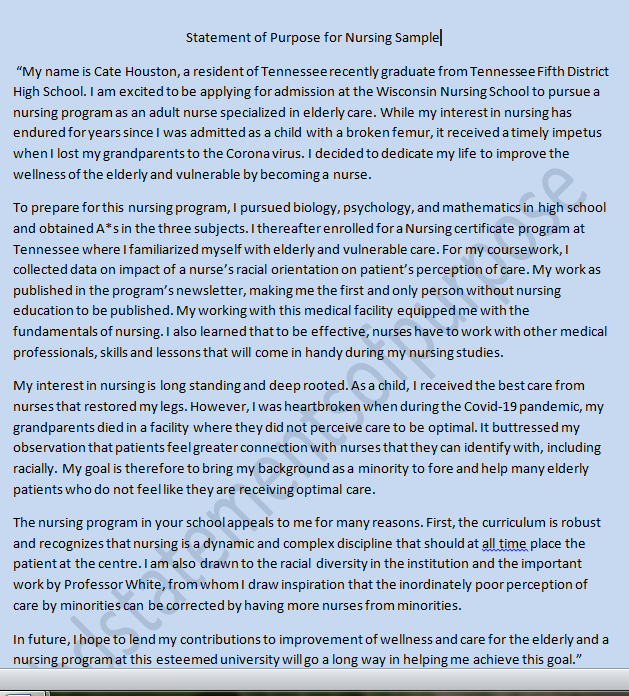
Statement of Purpose Sample for Nursing PhD
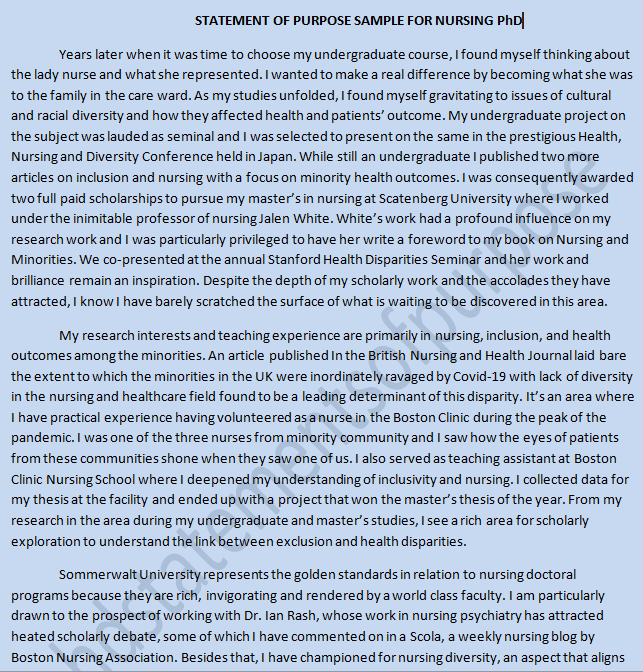
Statement of Purpose sample for MBA
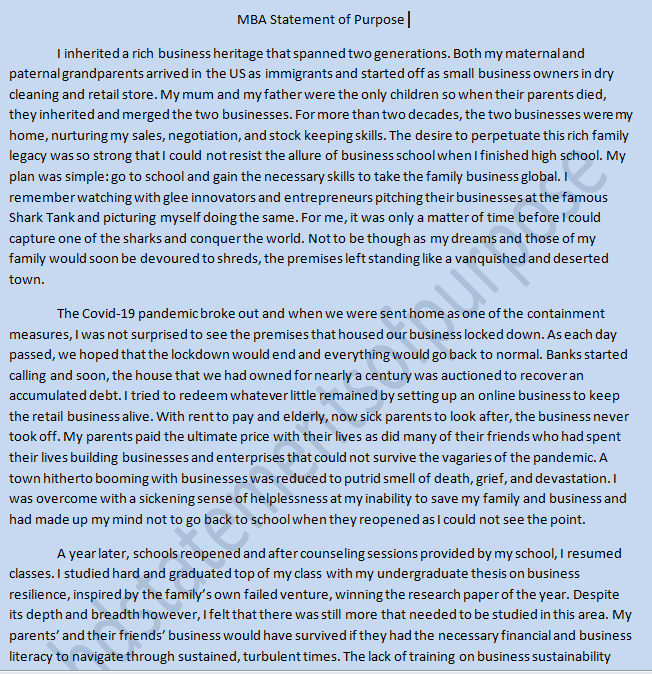
Statement of purpose sample for computer science 2
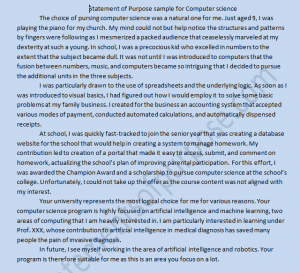
Statement of Purpose Sample in Cognitive Science
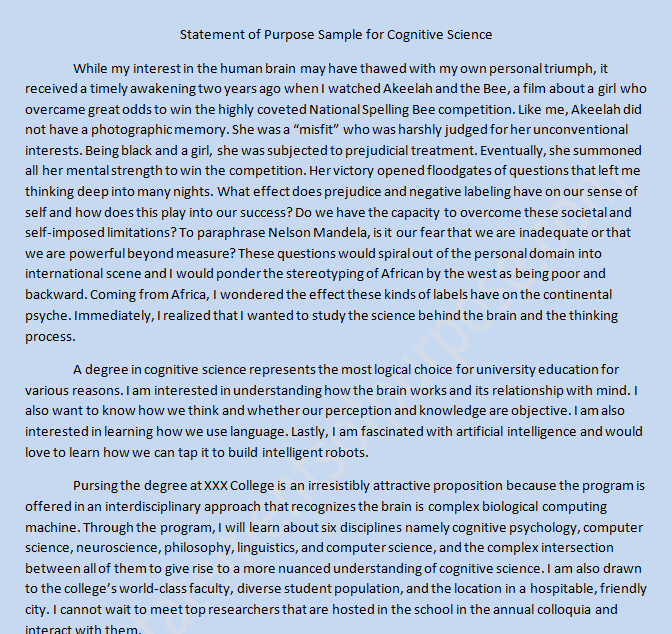
Statement of Purpose sample for mathematics
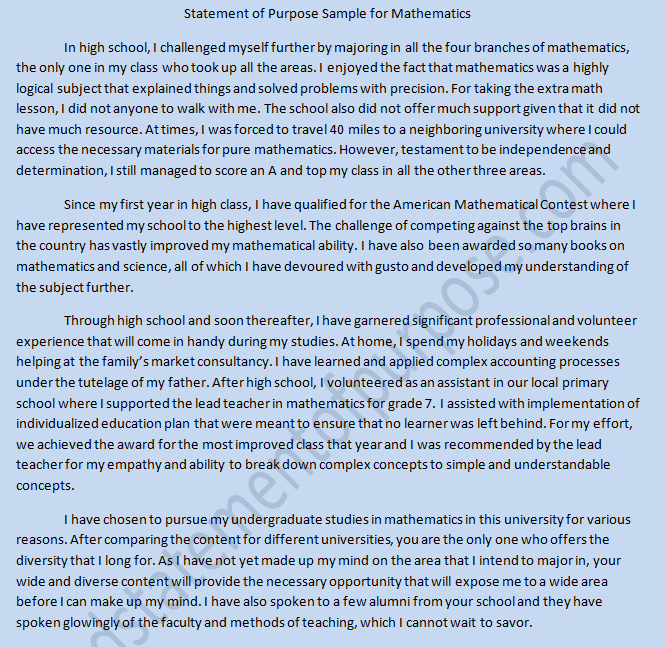
Statement of Purpose sample for MBA with Engineering Background
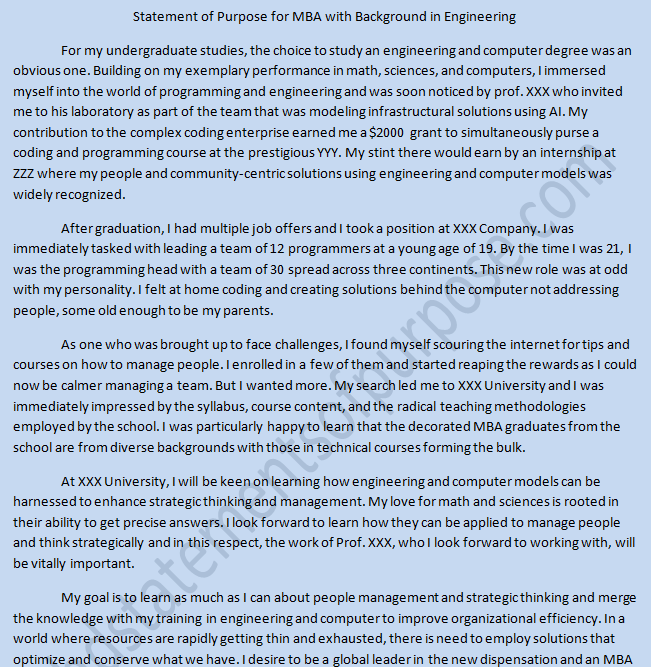
Statement of Purpose sample for Masters in Pyschology
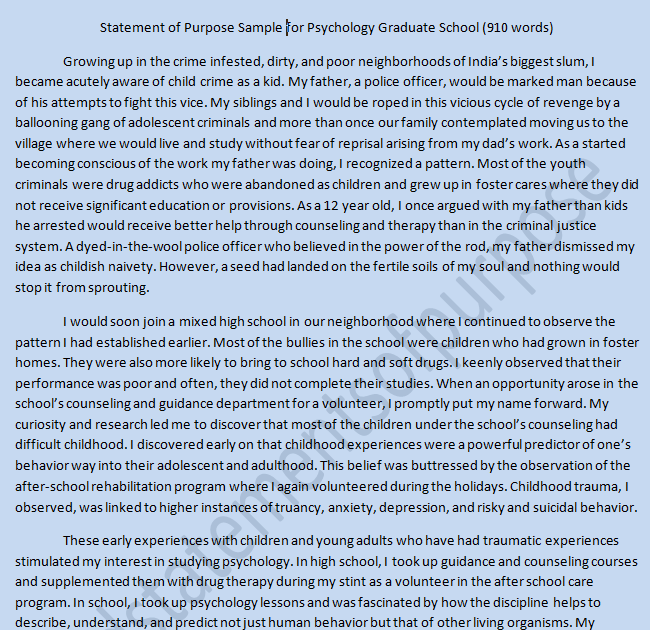
Statement of Purpose Sample for Computer Science
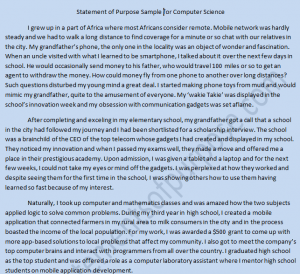
Statement of Purpose sample for Business Management
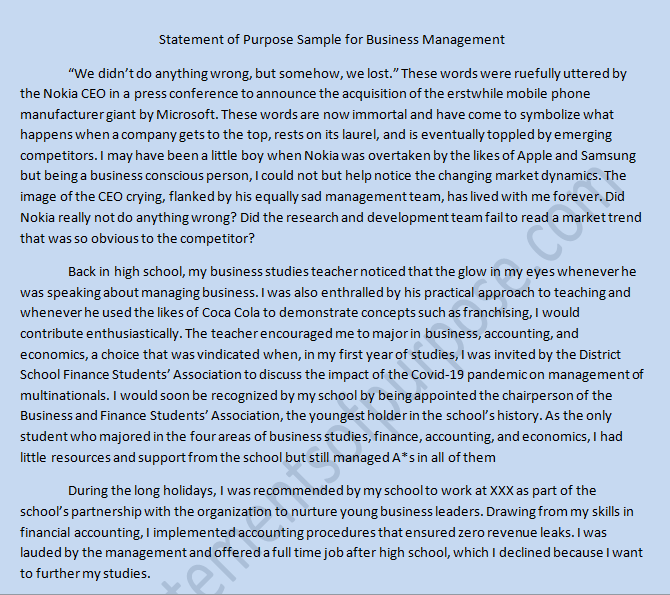
Statement of Purpose sample for Masters in Public Health
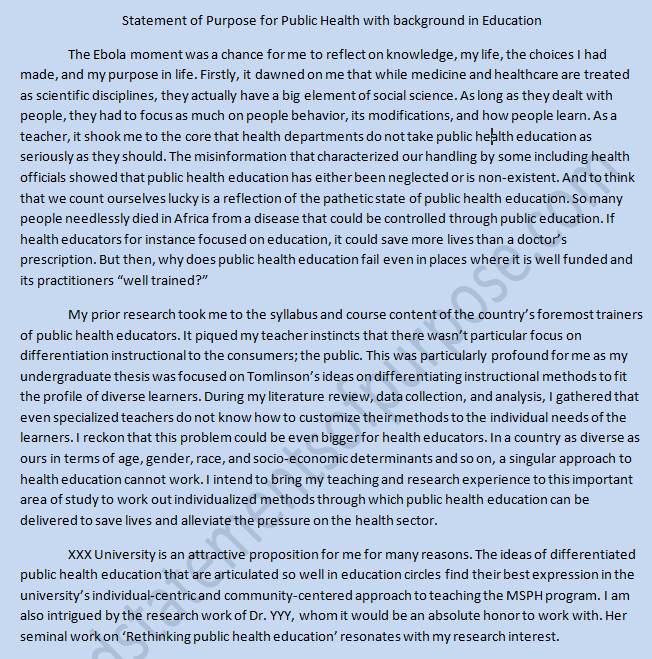
Statement of Purpose for MBA Sample (Ivy school)
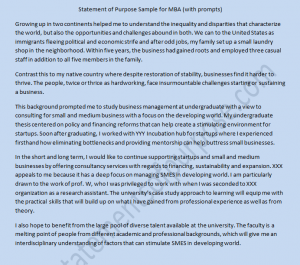
We also edit, review, and standardize other Admission Documents
Admission CV
Personal Statement
Recommendation Letter
Scholarship Essay
Motivation Letter
Cover Letter
Our Promise
- A SOP tailored to your program/university requirements
- Original, plagiarism free
- A SOP customized by an expert in your field
- Direct communication with assigned editor
- Proofreading and plagiarism check
- Punctuality
- Free revision for 2 weeks
- Confidentiality
- Money back guarantee

Let us Polish your Admission Documents
You don’t have to gamble an admission slot because of a low quality admission document. We’re the experts. You can count on us.
Expert SOP Help
- SOP for MBA
- SOP for Law Internship
- SOP for Tourism
- SOP for Social Work
- SOP for Graduate School
- SOP for Ph.D.
- SOP for Engineering
- SOP for Scholarship
SOP Edit & Review
- SOP Proofreading
- SOP Graduate School
- SOP for College
- SOP for PHD
- SOP for Information Technology
- SOP for MPH
- SOP Engineering
- SOP Medical
- SOP for Computer Science
What Our Clients Say
"After hours of staring at my computer screen and attempting to cobble up something together, I decided to try PhD Statements of purpose services. I enjoyed quite a peace of mind as they delivered a SOP that brought out exactly who I am. My nursing doctoral dream is now on course, partly because of the ivy standards services I received."
Michelle Stuart
“I Requested for an MBA SOP and I was quite nervous as I had never used the platform before. It's now my plug for all admission documents. Thanks a bunch."
I needed a Mathematics statement of purpose and an admission CV as quick as possible. These guys delivered these admission documents within hours of placing my orders. They reflected my individuality and I don't know how they did it. AMAZING!!
Dorothy Palmer
"I didn’t realize I could get such a quality Nursing PhD Statement of Purpose online. It was perfectly customized and individualized.Thanks for bringing me up closer to my doctoral program admission.<!-- wp:shortcode -->[learn_press_profile]<!-- /wp:shortcode -->
[learn_press_profile]
Top Streams
- Data Science Courses in USA
- Business Analytics Courses in USA
- Engineering Courses in USA
- Tax Courses in USA
- Healthcare Courses in USA
- Language Courses in USA
- Insurance Courses in USA
- Digital Marketing Courses in USA
Top Specialization
- Masters in Data Analytics in USA
- Masters in Mechanical Engineering in USA
- Masters in Supply Chain Management in USA
- Masters in Computer Science in USA
- MBA in Finance in USA
- Masters in Architecture in USA
Top Universities
- Cornell University
- Yale University
- Princeton University
- University of California Los Angeles
- University of Harvard
- Stanford University
- Arizona State University
- Northeastern University
- Project Management Courses in Australia
- Accounting Courses in Australia
- Medical Courses in Australia
- Psychology Courses in Australia
- Interior Designing Courses in Australia
- Pharmacy Courses in Australia
- Social Work Courses in Australia
- MBA in Australia
- Masters in Education in Australia
- Masters in Pharmacy in Australia
- Masters in Information Technology in Australia
- BBA in Australia
- Masters in Teaching in Australia
- Masters in Psychology in Australia
- University of Melbourne
- Deakin University
- Carnegie Mellon University
- Monash University
- University of Sydney
- University of Queensland
- RMIT University
- Macquarie University
- Data Science Courses in Canada
- Business Management Courses in Canada
- Supply Chain Management Courses in Canada
- Project Management Courses in Canada
- Business Analytics Courses in Canada
- Hotel Management Courses in Canada
- MBA in Canada
- MS in Canada
- Masters in Computer Science in Canada
- Masters in Management in Canada
- Masters in Psychology in Canada
- Masters in Education in Canada
- MBA in Finance in Canada
- Masters in Business Analytics in Canada
- University of Toronto
- University of British Columbia
- McGill University
- University of Alberta
- York University
- University of Calgary
- Algoma University
- University Canada West
- Project Management Courses in UK
- Data Science Courses in UK
- Public Health Courses in UK
- Digital Marketing Courses in UK
- Hotel Management Courses in UK
- Nursing Courses in UK
- Medicine Courses in UK
- Interior Designing Courses in UK
- Masters in Computer Science in UK
- Masters in Psychology in UK
- MBA in Finance in UK
- MBA in Healthcare Management in UK
- Masters in Education in UK
- Masters in Marketing in UK
- MBA in HR in UK
- University of Oxford
- University of Cambridge
- Coventry University
- University of East London
- University of Hertfordshire
- University of Birmingham
- Imperial College London
- University of Glasgow
Top Resources
- Universities in Germany
- Study in Germany
- Masters in Germany
- Courses in Germany
- Bachelors in Germany
- Germany Job Seeker Visa
- Cost of Living in Germany
- Best Universities in Germany
Top Courses
- Masters in Data Science in Germany
- MS in Computer Science in Germany
- Marine Engineering in Germany
- MS Courses in Germany
- Masters in Psychology in Germany
- Hotel Management Courses in Germany
- Masters in Economics in Germany
- Paramedical Courses in Germany
- Karlsruhe Institute of Technology
- University of Bonn
- University of Freiburg
- University of Hamburg
- University of Stuttgart
- Saarland University
- Mannheim University
- MBA in Ireland
- Phd in Ireland
- Masters in Computer Science Ireland
- Cyber Security in Ireland
- Masters in Data Analytics Ireland
- Ms in Data Science in Ireland
- Pharmacy courses in ireland
- Business Analytics Course in Ireland
- Universities in Ireland
- Study in Ireland
- Masters in Ireland
- Courses in Ireland
- Bachelors in Ireland
- Cost of Living in Ireland
- Ireland Student Visa
- Part Time Jobs in Ireland
- Trinity College Dublin
- University College Dublin
- Dublin City University
- University of Limerick
- Dublin Business School
- Maynooth University
- University College Cork
- National College of Ireland
Colleges & Courses
- Masters in France
- Phd in France
- Study Medicine in France
- Best Universities in Frankfurt
- Best Architecture Colleges in France
- ESIGELEC France
- Study in France for Indian Students
- Intakes in France
- SOP for France Visa
- Study in France from India
- Reasons to Study in France
- How to Settle in France
More About France
- Cost of Living in France
- France Study Visa
- Cost of Living in Frankfurt
- France Scholarship for Indian Students
- Part Time Jobs in France
- Stay Back in France After Masters
About Finland
- Universities in Finland
- Study in Finland
- Courses in Finland
- Bachelor Courses in Finland
- Masters Courses in Finland
- Cost of Living in Finland
- MS in Finland
- Average Fees in Finland Universities
- PhD in Finland
- Bachelor Degree in Medicine & Surgery
- MBBS Courses in Georgia
- MBBS Courses in Russia
- Alte University
- Caucasus University
- Georgian National University SEU
- David Tvildiani Medical University
- Caspian International School Of Medicine
- Asfendiyarov Kazakh National Medical University
- Kyrgyz State Medical Academy
- Cremeia Federal University
- Bashkir State Medical University
- Kursk State Medical University
- Andijan State Medical Institute
- IELTS Syllabus
- IELTS Prepration
- IELTS Eligibility
- IELTS Test Format
- IELTS Band Descriptors
- IELTS Speaking test
- IELTS Writing Task 1
- IELTS score validity
- IELTS Cue Card
IELTS Reading Answers Sample
- Animal Camouflage
- Types Of Societies
- Australia Convict Colonies
- A Spark A Flint
- Emigration To The Us
- The History Of Salt
- Zoo Conservation Programmes
- The Robots Are Coming
- The Development Of Plastic
IELTS Speaking Cue Card Sample
- Describe A Puzzle You Have Played
- Describe A Long Walk You Ever Had
- Describe Your Favourite Movie
- Describe A Difficult Thing You did
- Describe A Businessman You Admire
- Memorable Day in My Life
- Describe Your Dream House
- Describe A Bag You Want to Own
- Describe a Famous Athlete You Know
- Aquatic Animal
IELTS Essay Sample Sample
- Best Education System
- IELTS Opinion Essay
- Agree or Disagree Essay
- Problem Solution Essays
- Essay on Space Exploration
- Essay On Historical Places
- Essay Writing Samples
- Tourism Essay
- Global Warming Essay
- GRE Exam Fees
- GRE Exam Syllabus
- GRE Exam Eligibility
- Sections in GRE Exam
- GRE Exam Benefits
- GRE Exam Results
- GRE Cutoff for US Universities
- GRE Preparation
- Send GRE scores to Universities
GRE Exam Study Material
- GRE Verbal Preparation
- GRE Study Material
- GRE AWA Essays
- GRE Sample Issue Essays
- Stanford University GRE Cutoff
- Harvard University GRE Cutoff
- GRE Quantitative Reasoning
- GRE Verbal Reasoning
- GRE Reading Comprehension
- Prepare for GRE in 2 months
Other Resources
- Documents Required For Gre Exam
- GRE Exam Duration
- GRE at Home
- GRE vs GMAT
- Improve GRE Verbal Scores
Free GRE Ebooks
- GRE Preparation Guide (Free PDF)
- GRE Syllabus (Free PDF)
- GMAT Eligibility
- GMAT Syllabus
- GMAT Exam Dates
- GMAT Registration
- GMAT Exam Fees
- GMAT Sections
- GMAT Purpose
GMAT Exam Study Material
- How to prepare for GMAT?
- GMAT Score Validity
- GMAT Preparation Books
- GMAT Preparation
- GMAT Exam Duration
- GMAT Score for Harvard
- GMAT Reading Comprehension
- GMAT Retake Strategy
Free GMAT Ebooks
- GMAT Guide PDF
- Download GMAT Syllabus PDF
- TOEFL Exam Registration
- TOEFL Exam Eligibility
- TOEFL Exam Pattern
- TOEFL Exam Preparation
- TOEFL Exam Tips
- TOEFL Exam Dates
- Documents for TOEFL Exam
- TOEFL Exam Fee
TOEFL Exam Study Material
- TOEFL Preparation Books
- TOEFL Speaking Section
- TOEFL Score and Results
- TOEFL Writing Section
- TOEFL Reading Section
- TOEFL Listening Section
- TOEFL Vocabulary
- Types of Essays in TOEFL
Free TOEFL Ebooks
- TOEFL Exam Guide (Free PDF)
- PTE Exam Dates
- PTE Exam Syllabus
- PTE Exam Eligibility Criteria
- PTE Test Centers in India
- PTE Exam Pattern
- PTE Exam Fees
- PTE Exam Duration
- PTE Exam Registration
PTE Exam Study Material
- PTE Exam Preparation
- PTE Speaking Test
- PTE Reading Test
- PTE Listening Test
- PTE Writing Test
- PTE Essay Writing
- PTE exam for Australia
Free PTE Ebooks
- PTE Syllabus (Free PDF)
- Duolingo Exam
- Duolingo Test Eligibility
- Duolingo Exam Pattern
- Duolingo Exam Fees
- Duolingo Test Validity
- Duolingo Syllabus
- Duolingo Preparation
Duolingo Exam Study Material
- Duolingo Exam Dates
- Duolingo Test Score
- Duolingo Test Results
- Duolingo Test Booking
Free Duolingo Ebooks
- Duolingo Guide (Free PDF)
- Duolingo Test Pattern (Free PDF)
NEET & MCAT Exam
- NEET Study Material
- NEET Preparation
- MCAT Eligibility
- MCAT Preparation
SAT & ACT Exam
- ACT Eligibility
- ACT Exam Dates
- SAT Syllabus
- SAT Exam Pattern
- SAT Exam Eligibility
USMLE & OET Exam
- USMLE Syllabus
- USMLE Preparation
- USMLE Step 1
- OET Syllabus
- OET Eligibility
- OET Prepration
PLAB & LSAT Exam
- PLAB Exam Syllabus
- PLAB Exam Fees
- LSAT Eligibility
- LSAT Registration
- TOEIC Result
- Study Guide
Application Process
- LOR for Masters
- SOP Samples for MS
- LOR for Phd
- SOP for Internship
- SOP for Phd
- Check Visa Status
- Motivation Letter Format
- Motivation Letter for Internship
- F1 Visa Documents Checklist
Career Prospects
- Popular Courses after Bcom in Abroad
- Part Time Jobs in Australia
- Part Time Jobs in USA
- Salary after MS in Germany
- Salary after MBA in Canada
- Average Salary in Singapore
- Higher Studies after MBA in Abroad
- Study in Canada after 12th
Trending Topics
- Best Education System in World
- Best Flying Schools in World
- Top Free Education Countries
- Best Countries to Migrate from India
- 1 Year PG Diploma Courses in Canada
- Canada Vs India
- Germany Post Study Work Visa
- Post Study Visa in USA
- Data Science Vs Data Analytics
- Public Vs Private Universities in Germany
- Universities Vs Colleges
- Difference Between GPA and CGPA
- Undergraduate Vs Graduate
- MBA in UK Vs MBA in USA
- Degree Vs Diploma in Canada
- IELTS vs TOEFL
- Duolingo English Test vs. IELTS
- Why Study in Canada
- Cost of Living in Canada
- Education System in Canada
- SOP for Canada
- Summer Intake in Canada
- Spring Intake in Canada
- Winter Intake in Canada
- Accommodation in Canada for Students
- Average Salary in Canada
- Fully Funded Scholarships in Canada
- Why Study in USA
- Cost of Studying in USA
- Spring Intake in USA
- Winter Intake in USA
- Summer Intake in USA
- STEM Courses in USA
- Scholarships for MS in USA
- Acceptable Study Gap in USA
- Interesting Facts about USA
- Free USA course
- Why Study in UK
- Cost of Living in UK
- Cost of Studying in UK
- Education System in UK
- Summer Intake in UK
- Spring Intake in UK
- Student Visa for UK
- Accommodation in UK for Students
- Scholarships in UK
- Why Study in Germany
- Cost of Studying in Germany
- Education System in Germany
- SOP for Germany
- Summer Intake in Germany
- Winter Intake in Germany
- Study Visa for Germany
- Accommodation in Germany for Students
- Free Education in Germany
Country Guides
- Study in UK
- Study in Canada
- Study in USA
- Study in Australia
- SOP Samples for Canada Student Visa
- US F1 Visa Guide for Aspirants
Exams Guides
- Duolingo Test Pattern
Recommended Reads
- Fully Funded Masters Guide
- SOP Samples For Australia
- Scholarships for Canada
- Data Science Guide
- SOP for MS in Computer Science
- Study Abroad Exams
- Alumni Connect
- Booster Program
- Scholarship
GPA CALCULATOR Convert percentage marks to GPA effortlessly with our calculator!
Expense calculator plan your study abroad expenses with our comprehensive calculator, ielts band calculator estimate your ielts band score with our accurate calculator, education loan calculator discover your eligible loan amount limit with our education calculator, university partner explore growth and opportunities with our university partnership, accommodation discover your perfect study abroad accommodation here, experience-center discover our offline centers for a personalized experience, our offices visit us for expert study abroad counseling..
- 18002102030
Study Abroad
SOP for Mechanical Engineering – Samples & Tips to Write
- What is SOP
- SOP Writing Tips
- Statement of Purpose for Masters
- SOP for MBA
- Statement of Purpose for Phd
Updated on 08 February, 2024
upGrad Abroad Team
Upgrad abroad editorial team.
Writing a mechanical engineering SOP is no rocket science! An SOP (Statement of Purpose) helps aspirants showcase their educational journey, achievements, and passion for the course in front of the admissions committee. An SOP for Mechanical Engineering is needed at almost all leading universities if you have decided to pursue the program abroad.
Guaranteed SOP Acceptance. Get free Counselling
Table of Contents
Other course-wise sops, sop for mechanical engineering- format.
- SOP for Mechanical Engineering Checklist
- SOP Samples for Mechanical Engineering
SOP Samples for Mechanical Engineering: Sample 1
Sop samples for mechanical engineering: sample 2, mechanical engineering sop- what you should include.
While writing your mechanical engineering SOP, make sure that you include the following:
- How you discovered Mechanical Engineering?
- What grew your interest in the field?
- Your academic record to date.
- Projects, conferences, seminars, and other pursuits.
- Extracurricular activities like quizzes, competitions, and prizes won.
- Which aspects of Mechanical Engineering fascinate you?
- What do you wish to do in the future after pursuing the course?
- Why did you choose this course and institution?
Be honest and write about your achievements. Focus squarely on your passion for the subject and the reason for choosing the institution.
- SOP for Undergraduate
- SOP for PhD
- SOP for Data Science
- SOP for Business Analytics
- SOP for Engineering Management
- SOP for Project Management
- SOP for Construction Management
- SOP for Logistics and Supply Chain Management
- SOP for Business Management
- SOP for Hospitality Management
- SOP for MIS with Work Experience
- SOP for Civil Engineering
A suitable format can be the following:
- Introduction- This is the first paragraph and will state your reasons for pursuing the course while delving into your academic background.
- Second and third paragraphs- They will cover your long and short-term goals, how this degree will help, your experience, activities, projects, accomplishments, and more.
- Conclusion- The conclusion should create a lasting impression on the admissions authorities. It will demonstrate your love for the subject, why the degree at the institution will help you, and what you wish to do in the future.
SOP for Mechanical Engineering Checklist
- Does your introduction grab the reader's attention and provide a clear overview of the purpose of the SOP?
- Have you mentioned your name, educational background, and the specific program you're applying for?
- Have you provided a summary of your academic qualifications, including your undergraduate degree and any relevant coursework?
- Have you highlighted any academic achievements, awards, or honors related to mechanical engineering?
- Have you discussed any research projects, internships, or work experiences relevant to mechanical engineering?
- Have you described your roles and responsibilities in these experiences and highlighted any significant accomplishments or skills acquired?
- Have you explained why you want to pursue a master's degree in mechanical engineering?
- Have you articulated your career goals and how the program aligns with them?
- Have you mentioned any specific research interests or areas of specialization within mechanical engineering?
- Have you demonstrated knowledge about the program, faculty members, research opportunities, and facilities?
- Have you explained why you believe the program is a good fit for your academic and career aspirations?
- Have you mentioned any specific courses, projects, or resources the program offers that appeal to you?
- Have you highlighted any unique strengths, skills, or experiences that set you apart from other applicants?
- Have you discussed how your background, perspectives, or extracurricular activities contribute to the diversity and enrichment of the academic community?
- Have you summarized the main points of your SOP and reinforced your enthusiasm for the program?
- Have you expressed gratitude for the opportunity to apply and conveyed your readiness to contribute to the program's success?
- Is your SOP well-organized, with clear and concise paragraphs?
- Have you used professional language and avoid jargon or slang?
- Have you proofread your SOP for grammar, spelling, and punctuation errors?
By following this checklist, you can ensure that your SOP for Mechanical Engineering effectively communicates your qualifications, aspirations, and suitability for the program.
SOP Samples for Mechanical Engineering
Here are a few SOP samples for mechanical engineering that will help you:
Consumer needs are the biggest propellers of technological growth. Inventors and scientists often demonstrate a special ability to balance innovation and real-world applications. What sets their inventions apart is their sustainable nature and relevance from a futuristic perspective. Although basic human issues and requirements are still similar, the solutions keep evolving rapidly. My ability to focus on continual knowledge acquisition and evolution is what makes me stand out. Along with enjoying the sheer thrill of discovering how a machine functions, I have always been interested in knowing about machine faults and fixing them, along with the design quotient too. This innate passion has enhanced my abilities to find possibilities and areas of constant improvement while inspiring me to go beyond regular machines’ perceived limitations or operations. From my school years, I have always been passionate about theoretical systems in Science and Mathematics, which have contributed to physical advancements. I have received the highest grades in Standards 10 and 12, passing with distinction in Physics and Mathematics. Engineering seemed a natural expansion of my interests after high school. I chose Mechanical Engineering due to my overwhelming interest in machines and how they function. I successfully cleared the All India Engineering Entrance Examination, placing in the top 5% segment amongst 9,000 candidates. With a 98 percentile, I took up Mechanical Engineering as my course at the National Institute of Technology (NIT) Warangal, one of India’s foremost engineering institutions. My undergraduate studies at NIT Warangal gave me extensive exposure to various aspects of Mechanical Engineering, spurring growing interest in conducting research and knowledge-gathering. During my summer internship, I was fortunate to be employed as a trainee Mechanical Engineer at a reputed locomotive factory (give name and details here). The project covered the implementation and feasibility-analysis of current NDT (Non-Destructive Testing) practices for finding issues with multiple mechanical parts in coaches. Phase 1 involved examining numerous faults with coach parts and methods for finding them, while Phase 2 had me working on specific ways, including infrared and shock pulse for fault determination. I also proposed the usage of these technologies in various new areas. Wear debris tracking methods are applicable for roller bearings, while shock pulse methods help detect faults for alternator bearings. Working directly at an industrial facility helped me understand various fascinating aspects of the job and strengthened my determination of defects. I continued my studies and research in pursuit of advanced technologies in the NDT sphere. During my course, I also took up an academic project concerning Vibration Analysis and its usage in detecting faults in gears. I am presently researching several types of defects in gears with the help of technologies like vibration analysis. It is based on the premise that gear vibrations keep changing their frequency spectrum upon the occurrence of several types of faults. The project, fused with my current area of study, i.e., Noise and Vibrations in Engineering, have enabled the development of a greater understanding of how vibration impacts the overall design procedure and how faults may be determined faster through applying this knowledge. Throughout my years of study, I have not kept myself restricted to only specific Mechanical Engineering disciplines. I secured a 4.8 GPA out of 5 in Design while gaining a special appreciation for my grasp of Fluent and AutoCAD. I also came second out of 1,000 participants at the 3D-Creation contest held at my institution named Design First. My current project on fluid flow in pipes and channels and its analysis is also helping me understand Fluent better and its capabilities and applications. My engineering degree has given me a bigger thirst for research and knowledge-gathering in engineering and, of course, new-age technologies. A Master’s degree will greatly help equip me with finer shades of knowledge, stimulate intellectual curiosity and help me tap into emerging research opportunities worldwide. It will offer the practical expertise and finishing touches to my bent of mind for a fulfilling career ahead. After thinking it through, I have decided to pursue my Master’s program in Mechanical Engineering at your institution. I have chosen your institution since it provides an environment of path-breaking research, world-class faculty, an advisory panel for researchers and scholars, comprising top industry and scientific names, and of course, the abundance of professional research opportunities in the country. I am confident about matching the high standards at your institution while productively contributing towards research and advancement. I will be grateful to you if I am allowed to pursue higher education in my chosen field.
Recommended Reads:
Swami Vivekananda uttered the immortal lines- “Arise, awake, and stop not till the goal is reached.” My entire life and inspirations have been tailored to every word in the above statement. This statement best describes my outlook towards gaining knowledge, evolving, and adapting to change. Technology and engineering are dynamic fields that are growing rapidly. I have always tried to keep myself ahead of the curve by staying in sync with these changes. When I was in class five, my father was employed as an engineer at a shipping company. What stoked my interest in Mechanical Engineering from an early age was a love affair with machines. My father used to allow me to visit the ship’s engine room at times. I was fascinated with the seemingly limitless pipelines, boilers, gauges, and controls, along with the sounds of the turbines. It was a breath-taking experience that ultimately sparked my interest in machines. As I grew up, the frequency of visits went up, and I was captivated by the confluence of multiple operational mechanisms working together to execute one larger role. My interest in machines has been fuelled by a deep desire to unearth the design intricacies and functionalities of the same. This desire led to the development of my present questioning, evaluation, and reasoning capabilities. After completing high school with flying colors, I cleared the AIEEE (All India Engineering Entrance Examination) and secured admission into the University of (name), one of India’s most reputed institutions for engineering. Since I was inclined towards machines and their internal operations, I chose Mechanical Engineering as my major. From the first year itself, I was drawn to aspects like design, machine components, materials, production procedures, etc. I received intensive exposure to mechanical engineering throughout my course while understanding how physical sciences are applied for solving day-to-day issues. I focused not only on subjects related to my department, but I was also always keen on exploring computing languages and programming from a young age. This interest started during my school years and continued well into my undergraduate course. As a hobby, I started coding and using languages such as Java, C++, and C to create scripts that helped calculate variables and helped me with geometrical functions. I also started learning Pro-E and AUTOCAD while completing a certificate course alongside my final year of study in engineering. I also participated in sports, especially football and cricket, at my institution. I went on to represent my institution in several inter-college tournaments as well. This experience helped me immensely, teaching me qualities like teamwork, taking responsibility for every group member, and accepting defeat. I interned at the shipyard in my city (provide name) as part of my summer training project. The project covered possibilities and research about lowering the cargo and oil tankers with mechanical arms for loading and a change in the current piping system for deploying oil via pipelines to refineries. The objective was the reduction of smaller losses at the project. There were three phases in total, with the first one covering the entire system of operations. The second phase covered identifying problems and solutions, while the last stage was about implementing new ideas. For my views and inputs, I received a government certificate that I treasure to this day. It was my first exposure to solving real-world problems with the help of engineering and enriched my knowledge further. After graduating, I was placed as an assistant engineering trainee at one of the country’s biggest companies (give name). The entity deals with turnkey projects related to setting up diverse plants and machinery-driven operations. I was given responsibilities linked to the manufacturing of various types of equipment while later graduating to the design department, contributing to creating a storage tank for gases as per the prevailing standard design codes in the country. I was then promoted to the client’s on-site location as a site engineer, taking care of structural and foundational development along with piping. It helped me gain direct experience and industry knowledge of various aspects, including related fields like instrumentation and electrical. After my experience at this company, I resolved to develop my programming hobby into a full-fledged avenue of professional research, fusing it with my knowledge of mechanical engineering and machines. My present area of research covers mechanical operations in the oil and gas sector, which is in sync with my three years of professional experience. The Department of (mention department name) at the (institution name) offers a robust multicultural program that emphasizes my core areas of interest along with world-class faculty and a conducive atmosphere for research. I believe that I possess the intellectual capabilities, drive, and academic prowess to meet the high standards of your esteemed institution. I hope that my credentials and track record qualifies me as an eligible student at your institution.
What should I emphasize in my SOP for Mechanical Engineering?
In your SOP for Mechanical Engineering, emphasize your academic background, research or work experiences relevant to mechanical engineering, your motivation for pursuing further studies in the field, and your career goals. Highlight any specific interests or areas of specialization within mechanical engineering, and discuss how the program you're applying to aligns with your goals and interests.
Can I mention non-academic experiences in my SOP for Mechanical Engineering?
Yes, you can include relevant non-academic experiences in your SOP to provide a more holistic view of your background and interests. For example, you could discuss extracurricular activities, hobbies, volunteer work, or personal challenges that have influenced your decision to pursue mechanical engineering. However, ensure that these experiences are presented in a way that demonstrates their relevance to your academic and professional goals in the field.
How long should my SOP for Mechanical Engineering be?
While there is no strict rule regarding the length of an SOP, it's generally recommended to keep it concise and focused. Aim for a length of around 1 to 2 pages, ensuring that you cover all the essential aspects mentioned in the prompt or guidelines provided by the institution. Avoid including unnecessary details or repeating information already available in your resume or transcripts.
We are a dedicated team of study-abroad experts, ensuring intensive research and comprehensive information in each of our blogs. With every piece written, we aim at simplifying the overseas education process for all. Our diverse experience as journalists, content writers, editors, content strategists, and marketers helps create the most relevant and authentic blogs for our readers.
Exams to Study Abroad
Top study abroad destinations, important resources, get free consultation, similar articles.

I have been richly blessed with enormous opportunity to put my undergraduate studies in the USA in Computer Science (1993-1997) to good use; especially with respect to E-Commerce in Sao Paulo, expanding my horizons personally as well as professionally. I am fully confident that your PHD in Systems Engineering Program at CXX will serve me as the optimal springboard for the launch of a new phase in my career, helping my global fellowman to prosper, how to fish, metaphorically speaking. I calculate that I will be able to continue my full-time work load and family responsibilities and still study approximately half time, 20-25 hours per week. Thus, I especially appreciate the flexibility in this regard of your mostly online program at CXX.
Born and raised in Sao Paulo, Brazil, I first came to the United States when I was 19 years old (1991) to serve as full-time missionary for the Mormon Church in the Seattle area. After my two-year service, I went on to attend Brigham Young University in Provo Utah and stayed until my graduation in 1997, returning to Brazil to begin my career in the computer technology/e-commerce industry. Ten years later, I immigrated to Canada with my wife and 3 children, in 2007. We currently live in XXXX, British Columbia, in the Pacific North West, 30 minutes south of Vancouver.
10 years from now, I would like to be teaching at a college level, a practical, hands-on educator with a real-world focus. I do enjoy juggling theory and practice, however, especially when I build a robot, balancing the “chalk board” and “the lab” with a good deal of “trial and error.” My ideal job a few years down the road would be as an educator, teaching interdisciplinary technology courses, machine learning, robotics, and real-world applications.
For me, a “system” is a set of connected things or parts forming a complex whole; and systems engineering is the approach and means to enable the realization and successful integration of such systems. I now realize that I’ve been applying a systems-engineering approach to my work all along, just not fully aware of doing so. Being able to holistically envision how the different parts interact with each other and the processes needed to make them work together seamlessly is an ability that now, after many decades, thankfully, comes natural to me. Learning how to disassemble things since early childhood allowed me to combine the big with the small picture from early on and I feel strongly that I am now ready to give my finest contribution in systems planning, implementation, and operations.
I hope to bring my most valuable gifts to CXX, an inquisitive mind and a great urge to learn and contribute to research, dedication to work hard coupled to a firm determination to succeed. It is my sincere hope that my many years of experience both at the strategic and tactical levels in several different industries will provide me with valuable things to share in discussions with my colleagues.
Community service has always been central to my heart and in many ways, I am still the missionary believer that I was during my two years (92-93) of full-time missionary activity with The Church of Jesus Christ of Latter-Day Saints. I could not have been happier as an LDS missionary because of my profound joy of serving the community and feeling close to them. I continue to be very active in my community in Canada and this is another reason why I hope to be able to study part rather than full time at CXX.
I currently serve as a volunteer youth leader at Scouts Canada, part of the Venture scouting program. I am responsible for organizing career-planning and skills development activities, etc. I also volunteer at a local “DIY (do-it-yourself) Maker’s Club” here in Surrey, BC. I teach young people how to program electronics and create small robotics projects. I've been heavily involved with Arduino and Raspberry Pi hobbyists in my area, building and playing with all sorts of robot projects. Aside from being fun and challenging, this hobby allows me to maintain my critical thinking skills and develop further patience and resilience. Since last year I been taking flying lessons. Learning to fly a Cessna 152 has been a lot of fun and helped enhance my ability to interpret and react correctly in response to circumstances. I hope in the long run that flying will also contribute, perhaps in subtle ways, to making me a better technology professor in my old age. I thank you for considering my application to Systems Engineering at CXX.

Undergraduate & Graduate Engineering Programs, BS, BSc, MS, MSc, PHD.
I see Engineering Advancement as Key to the Survival of our Planet. By helping you to draft a highly eloquent and effective statement so that you are accepted to graduate school, I will have the opportunity to feed my passion for Engineering still further; often, I do extensive research on the client’s behalf, to the point that it is called for in each case. I especially look forward to contributing my editorial expertise to those of you who have long term career plans in the areas of solar energy, energy from fusion, carbon sequestration methods, management of nitrogen cycles, providing access to clean water, urban infrastructure, health informatics and medication engineering, securing cyberspace and preventing nuclear terror, and advanced personal learning through the engineering of scientific discovery itself.

Sample 1st Paragraph Masters Civil and Structural Engineering
I have been interested in problem solving and drawing from a very young age, especially everything having to do with mathematics. Civil engineering, structural in particular, is where my heart is. Now that I have completed my bachelor’s degree, I look forward to the challenge of graduate school with keen anticipation; I am highly motivated to pursue the skills upon which I will continue to build for a lifetime as a structural engineer.
Search by Degree, Field, or Country of Origin
I like it so much. Thanks for your time and help in writing this SOP. It is really awesome, I love it, thanks so much. I will recommend you to my friends who are applying for graduate studies. Thanks again. I hope in future to meet you personally.
HS (Applicant for Doctorate in Industrial and Systems Engineering, March 2011)
Premium Statement Service by Dr. Robert Edinger

Premium Service US$299.00
With maximum creativity, research as indicated, priority attention, and as many drafts as needed,
Dr Robert Edinger with Son David
1-812-675-4937
Engineering Ethics
Since I hold a PHD in Social Ethics, I am especially sensitive to the importance of the engineer ensuring the continuous improvement of their knowledge, particularly of their profession, disseminate their knowledge, share experience, provide opportunities for education and training of workers, provide recognition, moral and material support to the school where he studied, in this way revert to the opportunities the company has received. It is the responsibility of the engineer who carried out their work efficiently and supports the laws. In particular, ensure compliance with the standards of worker protection provided by the law As professionals, engineers are expected to commit themselves to high standards of conduct.
Engineering and Global Development
The Humanitarian Side of Engineering
There are scores and scores of humanitarian jobs out there for engineers like you. Engineering is one of the most useful fields to get into, and its diversity offers you a lot of freedom.
Let’s look at some of the organizations that provide work placements and paid opportunities for engineers.
Engineers Without Borders
There are more than 60 independent Engineers Without Borders organizations out there, and they operate in different ways, but they are united by the belief that engineering can solve problems for people.
Engineers Without Borders UK works with partner organizations and the education sector to allow people to use science, technology and engineering to aid human development. In 2015 at Engineers Without Borders (EWB) UK, a flagship initiative addressing engineering education called the EWB Challenge was endorsed by both the Engineering Council and The Engineering Professor’s Council. They’ve worked in Rwanda, Bangladesh, Peru, the Philippines and Cameroon, and recruit and support graduate and early career engineers to volunteer oversees for between 3 and 12 months, but there are paid positions available too. Have a look at their site at ewb-uk.org.
If you’d like to work with Engineers Without Borders Canada, who also help people in developing countries use technology to improve their lives, check out www.ewb.ca .
Jobs at The United Nations
The United Nations also looks for engineers to work at its different agencies, but you’ll find it easier to get hired by certain agencies that others. For example, the IAEA, or International Atomic Energy Agency hires Nuclear Waste Technology engineers, and Unattended Monitoring Systems engineers. You might alternatively be called upon to work as a weapon inspector in a conflict zone.
UNOSAT is a free satellite mapping service for the humanitarian community that’s produced satellite image analysis for emergency response during 270 natural disasters over the last 10 years. You could join them as a Satellite engineer or an environmental engineer.
UNOPS, or The United Nations Office for Project Services isn’t very well known, but it’s the agency that other UN agencies contact when field operations are necessary. The team there have built roads in El Salvador, shelters in Haiti and schools in Afghanistan, and they hire civil engineers with more than 7 years’ experience.
UN HABITAT is the United Nations Human Settlements Program and promotes socially and environmentally sustainable towns and cities. They hire Structural Engineers, Transport Engineers and others to help make cities in the developing world safer, greener and better for people with few resources.
For all the UN job openings an engineering could want to know about, check out unjobfinder.org, where you’ll see all the experience, education and competencies you’ll need to bag the positon.
For example, the Field Missions office was recently looking for an Engineer to analyze and advise on the planning, design, construction and maintenance of major systems and facilities and related structures needed for logistics support of UNAMID with a Master’s degree or equivalent in Civil Engineering, Electrical Engineering, Mechanical Engineering or another related field; a minimum of 7 years in progressively responsible roles in engineering or a related field. Engineering experience in international field/peacekeeping or military operations is highly desired.
So how are you going to gain all these career elements? Starting with a Master’s degree could work nicely. Let’s have a look at some of your options.
Masters Programs for Engineers With Humanitarian Intentions
The M.Sc. in Thermal Energy and Process Engineering at Aalborg University in Denmark focuses primarily on thermal energy technologies and systems, aspects of energy system modelling, heat- and mass transfer, control engineering and experimental work. This program is perfect for anyone passionate about the development of non-fossil fuels and the design of new, innovative energy technologies and systems to produce competitive and efficient solutions for the future.
At just over 12,500 EUR for international students at the time of writing, this 2-year, full-time course will set you up perfectly to later head towards humanitarian work with full force.
The M.Sc. in Sustainable Energy Engineering at the KTH Royal Institute of Technology in Stockholm, Sweden, is another similar course aimed at providing you with a state-of-the-art education in solar energy, power generation, energy utilization, turbomachinery and the transformation of energy systems. Graduates of this program have gone into positions in industry, governmental agencies and consultancies, and there’s no reason why this degree couldn’t guide you into work abroad in the developing world.
Tuitions fees for international students are in the realm of 15,000 EUR at the time of writing. You’ll spend 2 years in one of the most technologically advanced countries in the world, studying Renewable Energy Technology; Airbreathing Propulsion; Applied Refrigeration and Heat Pump Technology; Design of Photovoltaic and Hybrid Systems; Strategies in the Global Climate Agenda; Theory and Methodology of Science for Energy Research; Global Energy Markets and Systems in Transition; plus many more amazing, modern courses.
For a similar program in the USA, what about the M.Sc. in Renewable (Solar) Engineering at the University of Massachusetts Lowell, Lowell? It offers professional training designed to prepare students to perform state-of-the-art work on energy systems. It costs over 24,000 EUR for international students.
The M.Sc. in Chemical Engineering offered at the Georgia Institute of Technology in Atlanta, USA, is a course-work lead program you could study on for just over 38,000 USD a year, if you’re an international student. You’ll have the opportunity to research catalysis, reaction kinetics, complex fluids, microelectronics, microfluidics, bioinformatics, sustainable development, CO 2 capture, biomedicine, solar energy, thermodynamics, MEMS, cancer diagnostics and therapeutics, process synthesis and control, modeling, biofuels plus many more subjects.
The M.Sc. in Engineering Technology (Occupational Health and Safety) at Middle Tennessee State University, Murfreesboro, USA offers thesis and non-thesis options. You can do the M.Sc. in Engineering Technology with concentrations in Engineering Technology as well as Occupational Health and Safety, which will give you the opportunity to go into a broad range of technical and industrial management positions. You’ll over modules like Current and Future Trends in Engineering and Technology; Safety Technology and Engineering; Anthropometric Factors in Accident Prevention; Advanced Topics in Technology; plus many more subjects that could really help you make engineering more safe in developing countries.
For something a little different, there’s the M. Eng. Chemical and Biological Engineering Master’s program at the University of Colorado at Boulder, Colorado Springs, USA, which was ranked 14 th among all graduate programs, 8 th among public graduate programs and won research awards nationally.
The ChBe Department you would study at has an active program in renewable energy research, where they look into the production and use of hydrogen, the materials for photovoltaics, biorefining and biofuels research. This 2-year, full-time course also has modules in Chemical and Biological Engineering; Transport Phenomena; Chemical Reaction Engineering, plus many more.
Ready to dive into a Master’s program right away? There are a lot of options, especially in Europe where education is more affordable and the quality is high. Research and dissect every program that interests you, and when you need help writing your personal statement of purpose, shoot us an email. We have a long-standing history writing powerful statements for hundreds of students and engineers just like you.
Statements of Excellence for Admission to Graduate School in Engineering

PHD Engineering Statement of Purpose Sample, Saudi Applicant

After completing my undergraduate studies, I pursued a Master's program at Loyola Marymount University. During that period, I completed many challenging projects. For my Capstone Project, I concentrated on image compression and encryption – comparing two different approaches to design and assimilation.
I have always very much enjoyed technological research and have been a senior researcher at King Abdulaziz City for Science and Technology (KACST) for almost two years now. Our work environment involves joint collaborative work on projects with high technological value, in order to transfer and settle technology in Saudi Arabia. I have had the privilege of making major contributions to numerous projects. For example, our ASIP Project, for example, involves the design processors having instructions with parallel operations. It also relates to methods of decoding long instructions which have multiple operations for such processors and for mapping input and output ports to the same addresses. I am also very excited about our EMTYAZ project which is a joint project with KACST& Saudi Signal Corps. Finally, we are working on EMTYAZ , Software Defined Radio (SDR). The objective of the project is to design a very high performance jamming resistant.
My long-term vision is about technology transfer and settlement and owning the next big thing. I seek to contribute as much as possible to building up the infrastructure for scientific research within KACST where I am currently employed -inventing and developing useful technology for the world. I seek to make a highly effective contribution to scientific research, enriching the lives of people worldwide through new technological innovation. I want to continue my education to improve my knowledge and research capabilities Thankfully, KACST is providing me with full funding to complete my PhD in Electrical Engineering at XXXX University.
I also very much appreciate the focus on sustainability that is pronounced in your program at XXXX as I seek to make it a central integral pillar of my own professional development and the systems that I look forward to developing in the future in the KSA, always expanding the circles of scientific production research and interdisciplinary communications. The greatest possible contribution that I can make to my society, Saudi Arabia, would be to distinguish myself in the area of research and development in Electrical Engineering, perhaps teaching the subject as well later on in my career
I look forward to a long lifetime of professional engagement in the support of local innovation, content generation of all kinds through development of nationally-qualified professional standards of communication development. I look forward to providing technical consulting services to government sectors that will lead to vast improvement in performance, productivity, and flexibility in electronic communications. As a graduate student in your program, I look forward to learning as much as I can, in particular, about Information theory and coding, signal and image processing, digital design, and communication theory.
I love the way in which rapid developments in electrical engineering require one to constantly stay abreast of the research in order to stay current on the latest technological advances. I feel very strongly that I am ready for both the challenges and the unavoidable failures that come with them. I understand that great research requires patience and that one must understand that results do not come automatically and that the road can be arduous. I persevere because that is where I find my joy, solving problems. I think about engineering challenges almost all of the time, out jogging, lying in bed before I go to sleep, and when I wake up in the morning. This will help me to excel as an investigator and developer.
What I enjoy most is always learning something new, always being in touch with people and learning from them, especially those with extensive experience in an area that I seek to master. I always keep myself up-to-date in software, hardware, publications, for example, and I have a lot of valuable connections with friends and associates who help me to learn what I need to learn as efficiently as possible. Research, networking, and staying up-to-date are all integral parts of my daily routine.
I thank you for considering my application to your world-class program in Electrical Engineering at XXXX University.
- Accountancy
- Agriculture
- Architecture
- Asian Studies
- Communications
- Computer Science
- Construction Management
- Engineering
- Environmental Science
- Ethnic Studies
- Food Science
- Gender Studies
- Graphic Design
- Hospitality
- Human Resources
- Information Systems
- International Relations
- Latin American Studies
- Law Enforcement
- Library & Information Science
- Linguistics
- Mathematics
- Media Studies
- Medical School
- Occupational Therapy
- Physician Assistant Studies
- Political Science
- Real Estate
- Religious Studies
- Security Studies
- Translation
- Veterinary Medicine
- Women's Studies

IMAGES
VIDEO
COMMENTS
The graduate school Personal Statement (≈ Statement of Purpose ≈ Statement of Intent) is a document that complements your resume and application form, describing your profile in a narrative way and convincing the admission committee that you would be a good match for a particular department or program. Take into account that matching goes ...
The statement of purpose is usually the only part of the applicant's file where one can find strong evidence of whether the program will really mesh with the applicant's interests and ambitions. If you devote the statement to a list of the things the great things you have done, then you will merely exasperate the reader.
Structuring an Engineering Statement of Purpose. Your SOP will ideally include the following: An introductory paragraph that grabs the reader's attention and sets the stage for the paragraphs to follow. A few highlights of your abilities, education, and work accomplishments. Reasons for any gaps in your chronological work history or lower ...
A statement of purpose (SOP) is a critical component of most graduate school applications, and are often required for various types of graduate level programs, including Graduate Certificates and Master's Degrees. An SOP offers you the opportunity to showcase your motivations, qualifications, and aspirations to a school's Office of Admissions.
1. Brainstorm your ideas. First, he says, try to reframe the task at hand and get excited for the opportunity to write your statement of purpose. He explains: "Throughout the application process, you're afforded few opportunities to address the committee directly. Here is your chance to truly speak directly to them.
Your Research Is Your Purpose. Avoid Childhood Kindergarten-High School. "The big questions — how to control a cell's function, how to interfere with a cell becoming a cancer, how to stop heart disease — are still out there to be answered. The key is bringing fresh ideas along with new tools and technologies to the same old problems.".
Applicants must upload a statement of purpose in at least 500 words that clearly states their purpose in undertaking graduate study at the George Washington University; academic objectives, research interests, and career plans; and related qualifications including collegiate, professional, and community activities.. The statement of purpose must be written by the applicant.
A PhD statement of purpose gives admissions committees an introduction to your research interests and why their specific program is of interest to you. Like a cover letter for a job application, a great statement of purpose allows you to highlight your strengths, interests and experience. If you need statement of purpose advice, keep reading ...
Essential Tips. 1. What the admissions committee will read between the lines: self-motivation, competence, potential as a graduate student. 2. Emphasize everything from a positive perspective and write in an active, not a passive voice. 3. Demonstrate everything by example; don't say directly that you're a persistent person, show it. 4.
the coursework and research that graduate school will require of them. You hope to find clear and obvious evidence of this in the CVs, transcripts, and statements of purpose. • You are also looking for students who will succeed in graduate school. Here, the Statement of Purpose is key because a CV and transcript do not reveal this. For you,
Statement of Purpose. Selection committees want to hear that you have chosen to apply to their program for good reasons. Avoid telling them that it is because of rankings or that you grew up loving the university. It is very important for you to tailor your essay for each application that you submit. Some schools ask for specific information or ...
Introduce yourself, interests, and motivations. 3. Discuss your recent activities. 2. Summarize your undergraduate work. 4. Elaborate on your academic interests. Adapted from: Graduate Division, University of California-Berkeley. Writing the Statement of Purpose. (2018).
Your statement of purpose should assure readers—primarily the faculty on the selection committee—that your background and experience will support your success in graduate study. Think of the statement of purpose as a composition with five key parts: Part 1: Introduce yourself, your interests and motivations. Part 2: Summarize your ...
To help you present yourself effectively, follow these three steps to craft a quality statement of purpose for your master's. 1. Include All the Elements of an Effective Statement of Purpose. A well-structured statement of purpose exhibits your writing skills and clearly states your motivations and goals. Key sections include an introduction ...
Graduate programs ask for statement of purpose to hear about your interests and goals and why you think you and the program would be a good fit. There are four key elements to a successful statement of purpose: A clear articulation of your goals and interests. Evidence of past experiences and success.
Express clearly and concisely. As demonstrated in the statement of purpose for PhD samples above, writing an essay that is clear and concise necessitates a logical structure and a succinct, yet compelling language. Use simple, direct language, focusing on precision and clarity. Be mindful of wordiness and redundancy, as these can dilute your ...
The following statement of purpose is written by an applicant who got accepted to top graduate programs in environmental and sustainability engineering. Variations of this SOP got accepted at UIUC, ASU, and RIT. Read this essay to get inspiration and understand what a top engineering school SOP should look like.
Statement of Purpose for PhD in Biomedical Engineering (MIT Accepted) In this article, we analyse a Biomedical Engineering SOP that was accepted at MIT, Stanford, and Georgia Tech. Letters of Recommendation: A Guide and Sample for your Recommenders. Statement of Purpose Sample for Nursing (Undergraduate) (Highly rated)
An SOP (Statement of Purpose) helps aspirants showcase their educational journey, achievements, and passion for the course in front of the admissions committee. An SOP for Mechanical Engineering is needed at almost all leading universities if you have decided to pursue the program abroad. Guaranteed SOP Acceptance. Get free Counselling.
Dr Robert Edinger with Son David. [email protected]. 1-812-675-4937. Engineering Ethics. Since I hold a PHD in Social Ethics, I am especially sensitive to the importance of the engineer ensuring the continuous improvement of their knowledge, particularly of their profession, disseminate their knowledge, share experience, provide ...